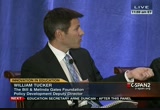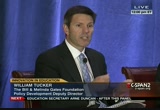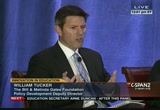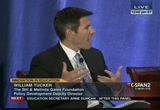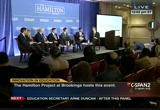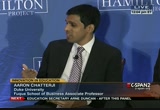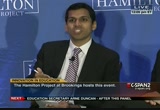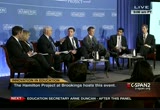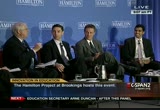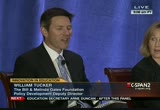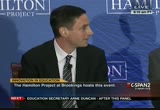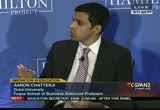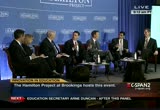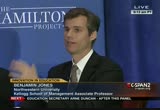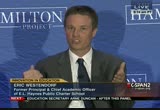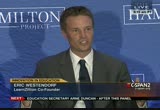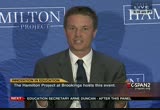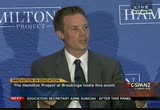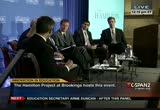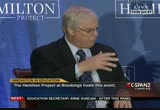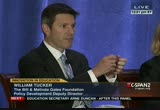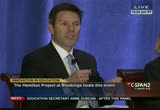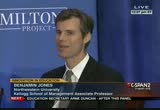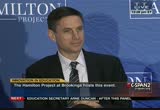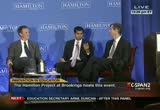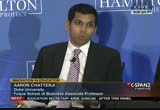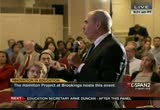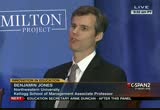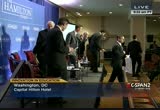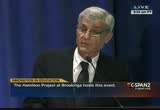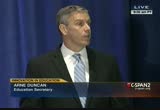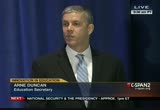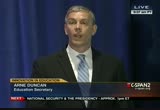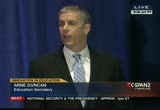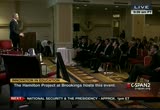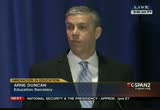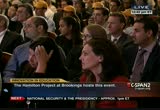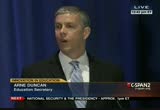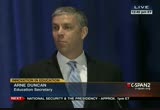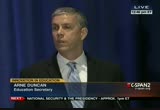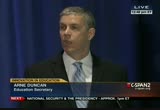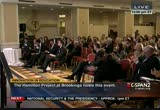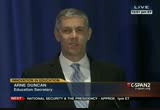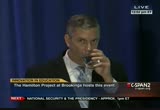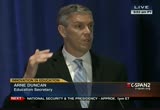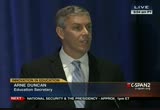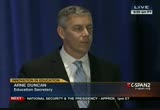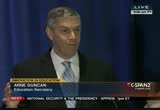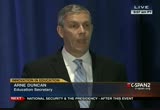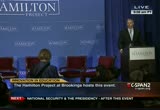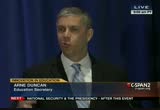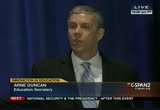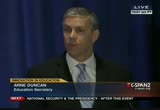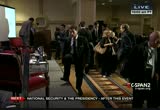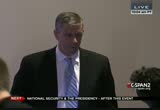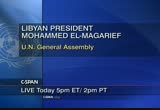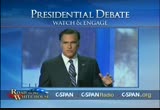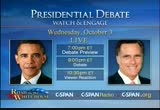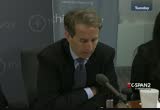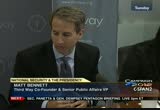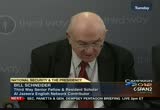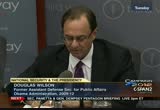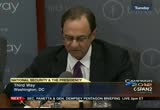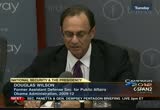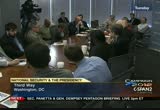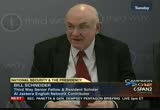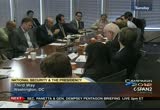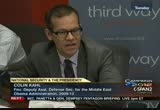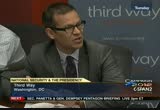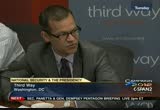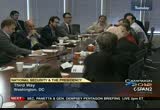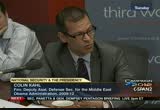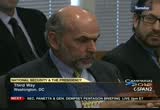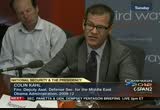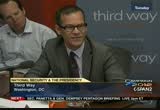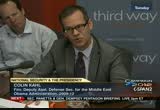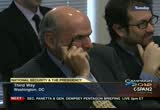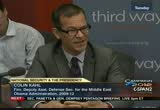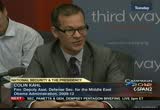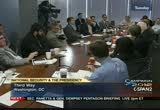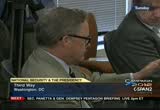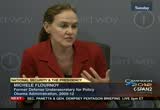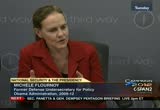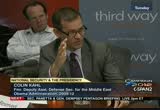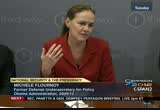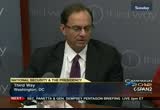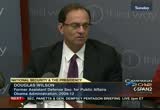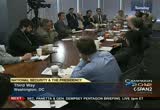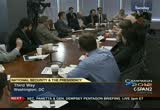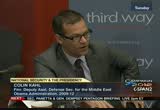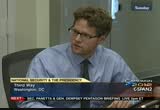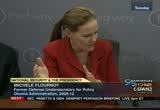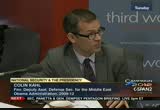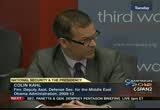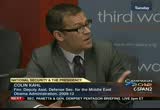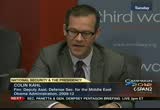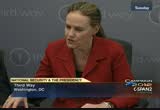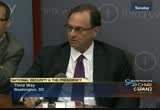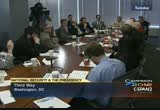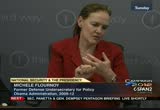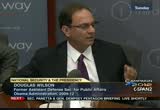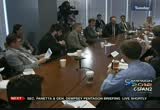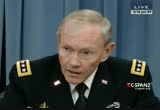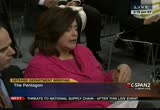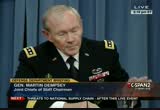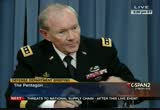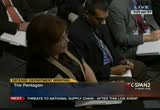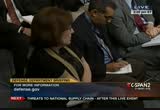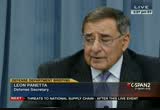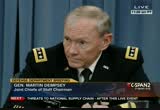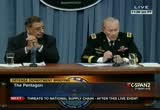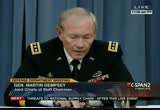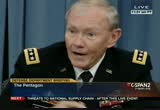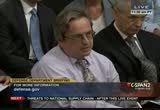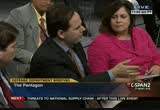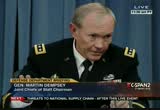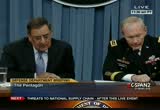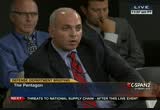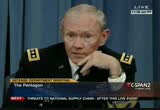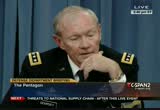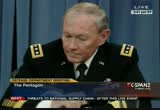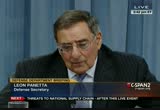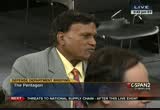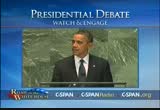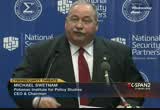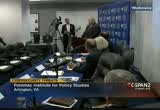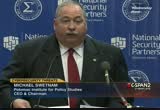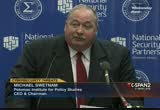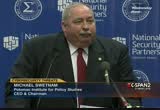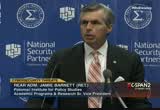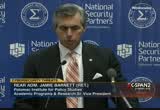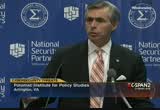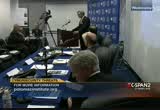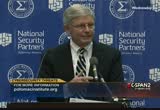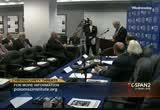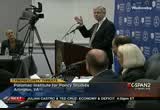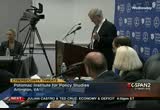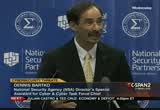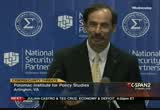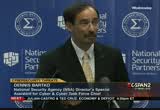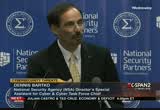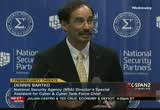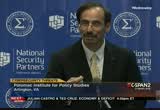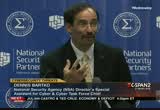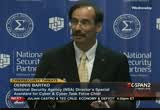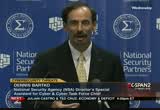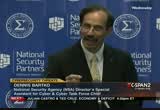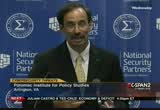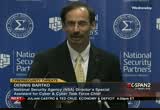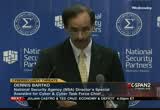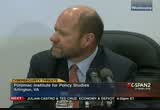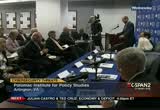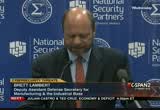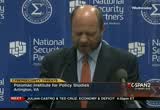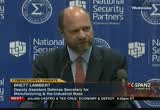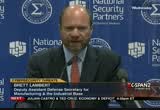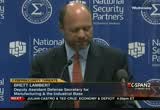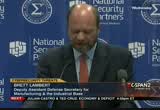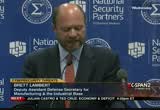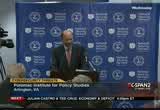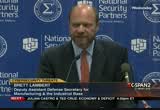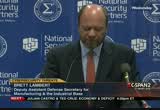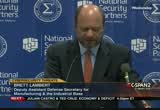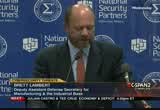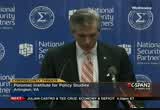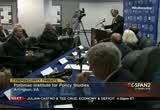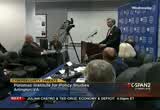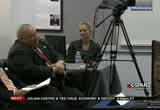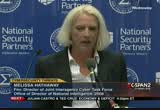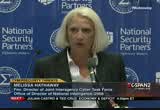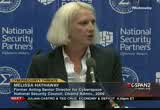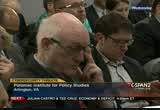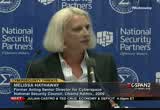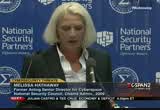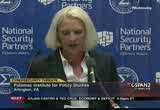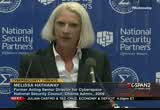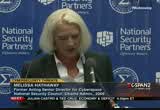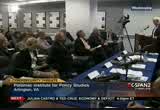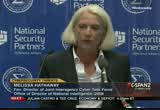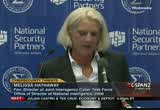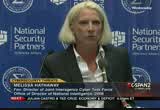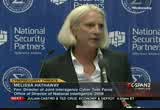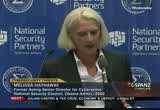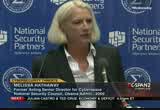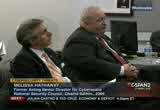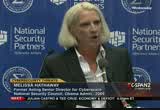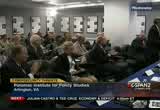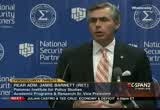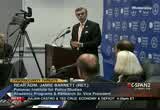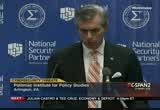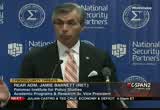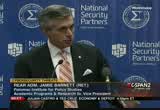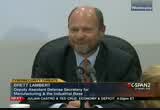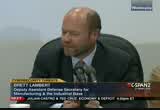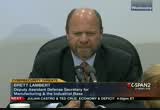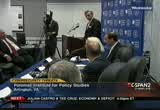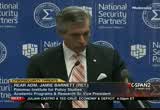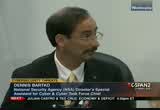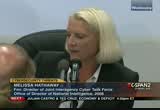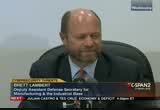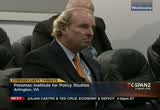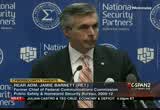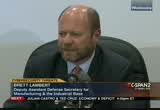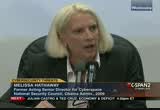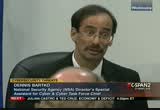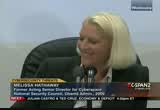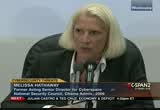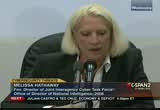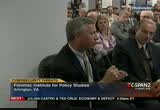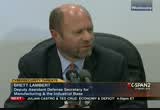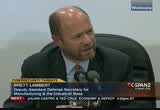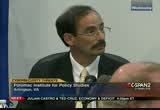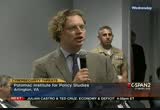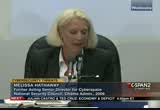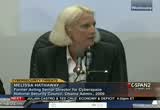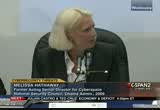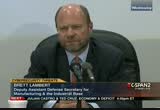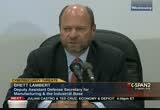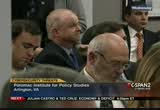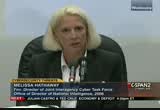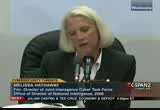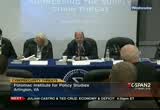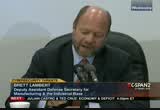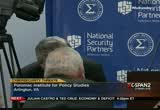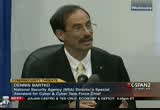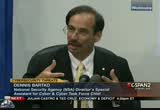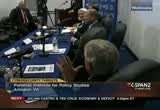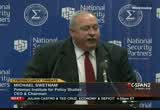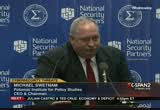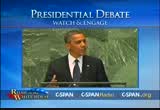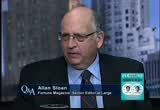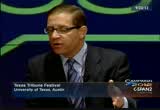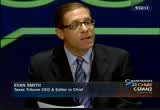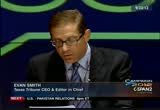tv U.S. Senate CSPAN September 27, 2012 12:00pm-5:00pm EDT
12:00 pm
and i talked with one of your lead teachers, who was one of your best teachers trying this out. we are first of all doing these types of videos that helped her really think of her practice and how to convince it down. what i was even neater because teaching is so difficult i don't expect everyone is making videos on their massive amount of spare time but she talked about providing directors kutz, so it is one thing, it's very difficult to get feedback commesso to be able to watch someone who's just great at their craft and then hearing them talk about what they're doing and why they are doing it is a really unique capability. and something that has a lot of promise. so i think that has a lot of promise for helping with instruction. ..
12:01 pm
and you can use that data to help make better decisions and learn things not the binary all or nothing, if it's effective or not. to this dependent it was helpful for the students that started here in the context, again, it's not just that judgment that you were talking about, eric what we get information to helps understand which student in which cases how can it get better or be complimentary. one of the things we are worked on is the shared learning initiative, and this is a way to sort of take all of these bits
12:02 pm
of information that are sort of siloed, so maybe if you are a teacher, you have this one instructional program for this set of students for this piece and this for this piece, and all that lives in separate places. you never see all of them together in one place. if it's like if your doctor had x-rays over here and blood tests other here and you couldn't put them together in the right way to get the whole picture of a patient. that's the way we're right now. to do that is incredibly expensive. that leads to a little bit of the problems that you talk about in your paper where, you know, let's not worry about trying to get the best stuff. let's stuff the that fits together and hooks in with the current system. that's one of the kind of geeky things. it has a lot of potential to open up better avenue news for educators and districts to make better decisions and help get evidence in a way, and in some
12:03 pm
ways that type of tool would make what they're trying to do a lot easier. >> thank you. >> i think you are the designated responder here. >> first of, it's great to get to the panel. it's fab it's aic. it there are so many good points to bring in the paper. i'm not going to spend time addressing all of them. afterwards i would like follow up with each you. it's going to make it better and stronger for for one note in the add yins you'll be on a panel like this what was life like before the app store. it they'll be shocked when you ask the question, not because you old but because they can't imagine what life was like before the app store. what you are seeing is incredible. where the imeerps and companies come from? what it is about transparency about you're getting. that's yew it's out there. you can count the things on your
12:04 pm
tablet and smartphone. we want to take the entrepreneurial innovation and use it to give teachers better tools in the classroom. that's what. the consumer report for educational technology health insurancing the energy around the world develop better tool for teachers. i think the panelists got it right in terms what we're trying to do. a few points that we're thinking about first the issue about power. who controls it? the person who controls the platform will have a enormous platform. we need to be careful. we are going to be careful about conflict of interest. we're not going to allow anyone to make investments in educational technology companies. consumer reports have a great online of the interest rules. they don't take free samples, for example. we're going to have the circles in place to make sure that we're not biasing the test result and
12:05 pm
the rutlez. when you do that the swhoal system falls apart. that's something we're talking about. the second thing we brought up is about equity. it's an important issue when you're thinking about technology in the classroom, the issue around the digital dwoid. one thing we're happy with is the ability to pick up what we call energy treatment effects. that's the worry one technology might work for one group we not another. the wonderful thing about the platforms you can figure it out if it works for which kids. some of the equity we hope they contribute to met gait those. that's one of the things that will be a big priority. two other points the lean start-up rule as a professor in the business schools. it's one of the most exciting trends people thinking about how to do quick integration. you build company, set up a product, figure out what works and go back to the drawing board. wouldn't it be a shame if you
12:06 pm
came here and had a bad rating and you couldn't come back and do it again we are going have a system of prototyping. teachers can try the version of the program. see how it goes and improve it and get back later. we hope it will facility the prototyping. the last thing, which i really like, is the said by a couple of panel lists, including bill is translating data in to action. you saw how many smart people we have in academia at the school level, government, generating data about education. how do you translate in to action? that's where we think it scrolled an important role. make sure that the data doesn't stay on the computer or the hard drive. get it to people so they can make decisions. that's one of the things we're trying to accomplish. are were a lot of other good points i would rather her about the panelists and the q & a i appreciate all the comments. >> one thing i wantedded to add
12:07 pm
too is the one most of the positive things about when i read your paper about what you're doing is for the practitioner, you are meeting an extremely important need. that is right now there are so many innovators and ideas out there they are everywhere. there's got to be a way to sort it. i think part of the concept is so important. it's like right now, in both places you go, people talk about the common core standards, and those are done. they have been adopted by 46 states. now is the implementation. it's a huge important step. what will we be doing differently in classrooms? almost every you see now is aligned with the common core standards. i don't believe that. but they say it because that's a good marketing line to go with the new software or curriculum. part of the concept that is so
12:08 pm
exciting somebody will doing that they'll be able to tell you whether they are are aligned with the common core standards or if that is a passing line. >> i think one thing to think about is think about as part of a ecosystem of tools that do exactly what zen nice says. right. we slam that label on. it was the same old stuff we new label. that's not what we want. it might take some of the burden off so this is one particular set of information, you know, maybe quantitative information that comes from a set of tasks, we also information from the people who are actually using these tools. so teacher feedback, student feedback, that's going to be a really important component. there's probably going to be expert reviews that will be another important component. so i think one of the things that is helpful here is think about this and we terms
12:09 pm
throughout education and it's important is multiple issue more thans. we begin to get the full picture of a lot of these tools. the information about how it's actually helps students achieve. it's absolutely critical that we can't do without that. the other pieces, i think, will be helpful and i think probably might get to some of your concern, eric it's not just that information it's a little bit about wow, how do these things improve, how do they get better? how do they fit in the classroom and i think that can give a more full picture. >> one quick thing about disa that. and so it's -- he said we have so many data in education. actually we continue. a lot of it is a manual. it's hard to get what happens in a classroom and understand much more. but what we will have as a we move to a digital environment. we are going it have a lo of dpa that. it's going to be the rocket
12:10 pm
fuel. we'll understand much more about as you said which students in which contexts and which situations, lots more addition seg -- the ability to dissegregate the data and understand more about specifics. that's definitely one of the important things. and data will also help us understand more about how people learn in general. we'll be able to understand, you know, about how do people actually tend to learn fractions and people able to test them on the theories in a more rapid -- much more rapid format than our previous sort of manual situation. >> there is some agreement that there's at least a kerneling of a good idea here. i wonder if you could talk about. a good idea usually don't cost $5 million or less. how exactly would it work? >> let me start. >> okay.
12:11 pm
, you know, when asked about the budget for hypothetical organization we did what the architects do. we put a blueprint together and twhaibt it would look like. we think about the staff you would need for an operation and where the money would come from. for the interesting thinking about five staff members. an executive directer a directedder of research that would work to collect the data that karen is talks about and we want to get here is to not lose a voice of the teachers. woat in the creation of the flat form, the user ratings that bill was talking about and great ideas about how to teach difficult concepts. so we're hoping through all stages that directer would interact with the school systems and aggravate that. -- we think they're going to find the proposition very attractive. there were start-ups companies around the world that are looking for -- but they don't have the sales force to go and
12:12 pm
sell to different schools certainly not the 100,000 schools. we think we have coten gauge with them. you need the administrative play and the regular -- there's lot of regulatory issues that need to be worked out. we try think about those around privacy sei and the parental permission forms. schools like the one in new york sorted the things out in the past. there ways we can use. these were some of the staff members we are going to have. the $5 million where it would come from? the fund might have an influence on the result. we don't want that to happen. we're looking for foundations that already have an compressed interest in education. there are several here. not to look directly in your direction, bill. and also the department of education are, you know, i3 grants looking directly at you. there are a lot of different funding courses.
12:13 pm
yeah. [laughter] but they're doing great work on a great project. that's how you get started on the scale of $5 million. we want to build something sustainable down the road. that's what many social entrepreneurs are talking about. we talk about the user fees scaled give the size of the company. we hope to be sustainable without government funding. that's how we are thinking of setting it with the $5 million. >> the concept is to leverage the great ideas out there. the reason it's relatively inexpensive. maybe it's incorrect to some degree. it it's going to be relatively inexpensive. it's about setting up a situation of rules. it's not about now knowing the right answer wrp it's about creating a system where great teachers and ideas or other entrepreneurs can come together and say okay, let's jump on this platform and find out what works. and commute -- communicate that
12:14 pm
to the public at large. when you look at healthy innovations system, it's not about nowing at the center what the right answers are. it's about creating a system which draws on the immense creativity the different expertise and the expertise and the perspective which is going to be right and some will be wrong. all out there. we have so many out there democrat school systems already, how do we engage than and let it come to everyone's benefit. what we are doing is cheap. and leverages some. thank you. >> eric, be willing to pay i don't know what the fee to get vailgted -- evaluated? >> $1. [laughter] >> one thing, thing tandem with there being something like this available is also just one of the reasons this is a problem is also the way the industry structured right now you have traditionally a situation where
12:15 pm
an europe comes up with an product and realizes for that product to be profitable, they need to find that one decision maker right cho is going sign that check and pay for it for an entire district. it's hard for start-ups to get in the to this base. it requires the unbelievable sales course that is not widely dispersed but happens to have all the connection. you have the meeting and convince them they need this for the whole district. and in that's problematic because it's leads all sorts of distortions around what works and what doesn't. it leads to a situation where entrepreneurs are not spending their time focus on the end users. how do i interrate around that decision manager who is going to sign the check instead of how do i interrate around the teacher who is going to use this as a tool. the parent who is going to use it as stool so all my --
12:16 pm
procurement hoops but spent trying to win over the hearts and minds of the user who should feel like this is a beautiful tool that makes life easier for them and makes them more effective. and so it's also interesting because you're starting to see one example of this where the premium model is starting to be used. it's free. and we do that on purpose because now we have a district contracts that allow us to get great feedback from what districts. the weapon want as much participates and teachers using this. we can collect the data on our own, even on our own start to use google an lettics other tools to find out what do folks whale want. what do they spend their time doing so we can double down on the things and give them what they want? and i think that's knew. it's not proven yet. there's a a lot of skeptics.
12:17 pm
you try to get a lot of folks to solve a problem for a lot of folks and figure how to layer on premium services faps new model. i think it's very exciting in the space. because i think to the degree, it goes back to the last panel where, you know, the idea of respect for teachers, i think often also teachers are left out of the decisions and they are the ones using the tools. when they're not the ones making the decisions about the tools that help them. it's problem thematic. there's an exciting opportunity to go straight to teachers. give them something powerful and then work on making it as useful for them as possible. then go up to the district leader and say you know, 20% of the teachers love this. here's what we can do to troll up a at the compelling way for you. so that it's not the enterprise sale. it's the bottom up approach. that working in collaboration
12:18 pm
with type platform, i think, is really exciting in terms of the trend toward creating stuff that is going to be helpful for teachers, parents, and students. >> yeah. i think this is a -- [inaudible] if we can do all of the things. what e the other thing i would layer on i wanted to mention is the notion of procuring reform. i know that sounds exciting to everybody in the room. but when we have been thinking about a lot about the different kinds of things that will actually help people be smarter about what they're purchasing and also help sort of -- we think like aggravated purchasing. when somebody finds something they find that is successful how do we leverage the distribution power of the internet, for example, to share that out broadly, widely, so other people can jump on? ing a ate georgia it'ds purchasing is one. different states and districts spend a lot of time fine tuning and honing this. we have been looking a the model of creating an onlike wick i can
12:19 pm
that brings to a third point which is the advanced market requirements. if, you know, [inaudible] a dozen other superintendents or you got teachers together to design what they would like. it if somebody could tbild for us this is what we would like and get better and better at articulating needs and what they would like. that was actually provide to the imeerps who are all other the place looking for great ideas. i talk to folks multiple times a week. people who want to do to build something. if this kind of information can get provided back, again, the whole echo system of the smart supply and demand is going to be improved. >> one of the -- i loved what you said about using the
12:20 pm
practitioners. they said you. i was glad i didn't have to say that as a representative of over 3 million people who worked there. but what's really exciting to me is the ability to when you say you strong to find the person in the district is that when you look at every form in the country, whether it be changes in the technology and how we use it, the description i would use is we have all of these campfires of excellence all across the country. and by definition of campfires, not supposed to spread. it stays right here. and what we need is a brush friar. and what you're tiring -- describing is a system who connects people who have similar ideas or similar challenges in a district. maybe the district that gets an influx of english-language learners. maybe only two of the schools in the district they never had it before. what do we do and it's a way of connecting good practice with effective tools whether it be curriculum or practice
12:21 pm
professional practice to people who have like-problems or who are like-minded. ic that's a huge possibility what we always talk about how do we gear it up or move it out from the places? i think there's real possibility in creating circumstances you can you can go around the boundary that currently stop us. >> bible i will give you a schabs to be the last person on the panel. do you want to add something in. >> sir, there's so much to say here. i do want to focus us a little bit before we just are overly optimistic on one of the pieces that i thought you were really good about in your paper. where you talked about the types of things that would be good for right now. an and you're really clear in the paper and thing the presentation that this type of tool at least right now, is good for kind of the point things that are sort of almost like the
12:22 pm
-- yeah. be great for the app-type of situation. i have a 3-year-old and 5-year-old i'm in your boat. but in other words, the sort of single implementation or the piece, the real micropiece. you talk about the microskills or the small pieces, so i think that could add a lot of value. it doesn't though it wouldn't throw there are all sorts of products as we think more broadly and all sorts of interventions that are more complex than that. i think this is bigger problem, this is a piece of it. and this is a bigger problem that we need a lot of different folks working on. and probably a lot of different ways to slice it. and so i hate to go last and throw cold water, but i just want us to be realistic about the challenge here because they have unheatherred a huge
12:23 pm
challenge. don't walk out saying great, they have this check. how do we make sure the innovation moves forward and does good is something we ought to wrestle with for awhile. >> we have time for a couple of questions from the floor. i think over here there's a particularly excited person. [laughter] [inaudible] >> partner -- [inaudible] and i'd like to talk a little bit about this bigger and broader issues. basically my job is to help companies that are somewhere between zerona and 30 billion [inaudible] to create traditional capital -- [inaudible] or it -- [inaudible] and one of the things that i do to enforce that is to look at the program and [inaudible]
12:24 pm
and i would have to say that i don't think the problem that we face is fundamentally one of a lack of innovators. or for that matter, a lack of programs that have been proven to be effective in clinical drills or otherwise -- trials or otherwise. the problem that i see, is that for all intents and purposes, programthth sei is a -- purchasing decisions. that, you know, one of the other things i do to help my clients is i look at literally i have a staff that literally reports to me on every single school improvement-related rsp, that comes out from the local education agencies, the state education agencies and the federal government. and i look at at those rpfr and
12:25 pm
it is a relatively low component of the decision across the board. and i think if you do not have a demand that programth etic sei of the procurement decision making prosuggestion. all of the high quality evaluations in the world aren't going make a whole lot of impact. and i think that's something you really have to address as much broader question. >> question is is -- looks like you want to take it on. >> well, yeah. so first of all, yes, we need raised bar and begin to ask for more information about the kinds of things we're purchasing. absolutely. right on. the problem that we have and the very difficult to get the
12:26 pm
information especially about learning technology because they are rapidly changing. our traditional trials take long time to do. by the time they are done, and we have done a lot of them. we pay for these throw through the federal government. the product has likely changed, different, or gone. right, so this is an attempt to see if we can get some more -- [inaudible] the economists some more better information so that in fact can begin to ask for more evidence. i think all of us would love more evidence about the kinds of things that work, don't work, are promising with or not promises. certain situations in a certain context. that is absolutely an aspirational goal. we should build that. we need more information. as everyone said it is one element in a bigger echo system of trying to get better information. >> can you say that again? you wanted to hear from economists? >> i do.
12:27 pm
all right. >> question should probably just go home and take a nap and celebrate. [laughter] >> i introduce myself as a economist and people turn to my wife and say what do you do? in addition to what karen said, i mean, put yourself in the buyers chutes. if you don't know what works how can it become a meaningful part of your -- u if you want me to choose between seven choices and you don't want someone to -- that's reasonable. no metaphor is perfect. take the health sector. we have insurance companies and hospitals. we have doctors, think of the doctors as teachers. the idea about how to treat their patients. there's lots of debates. you have clinical trials for a pharmaceutical company are expensive. and yet, we see 100 times the
12:28 pm
rnd rate among farm pharmaceutical companies. they are entering because if they prove it working with if they prove their medicine is better. guess what even though it's a balkanized even though doctors don't agree there's a smart demand greated and people will adopt. it i take your point. there are challenges for the buyer if they are natural if they don't know what works. there are other ks. if you provide information we will only move in the right direction whether it's the brush fire or not. everyone is up against fire retardants. it will remain to be scene. without the information i'm not sure how we goat a point where it's a meaningful or useful part of the decision making process. [inaudible] >> thank you. >> some other questions too. over here. the woman in red. >> hi. i'm development consulting working with small business and small non-profit.
12:29 pm
two questions one with regard to the [inaudible] to the do you have prosed bylaws with regard to the tenure of your board as well as your advisory counsel? especially with regard to if your membership can't do activities, investments in anything that is associated with the product, you know, it's going to prevent them to do what it is they do. and secondly, what are the conversations you're having with let's say the patent trademark office, small business administration, associations, and even let's say using guide star as a tool in increasing your participation of potential entrepreneurs as well as . >> yeah. these are great questions. first of all, just -- this is a proposal to lost organizations. a lot of questions you're talk abouting are things that are to be done rather than have been done. i'll start with the second point
12:30 pm
whether it's pto or small business administration. they seem like national partners both to link small business and imeerps were working to -- are working on the softwares to the platform or in the patent issue. i think that's what your alluding to, right. these are things that are onn't mind. these are conversation that will be had. i can't say we have a plan to deal with it yet. the first thing with tenure for the board, i think it's an important concern to have the right kinds of bylaws to make sure there's not basic conflicts of interest. that's the issue that dennis was raising about if the organization from the outside doesn't have credibility. if people believe the results are -- there's no way we can build what works right in to the educational software space. that's our main concern with how we are taibtding that. in terms of the rule there's a lot of ways. right now we are consider a menu of option. we haven't settled on one particular kind of guidelines.
12:31 pm
>> let me entrepreneur in. the proposal i've been impressed by the safe guards they're trying to put out against the influence from the companies who would like to principally be evaluated. terrorist there's a world lighterrered with the examples that getd corrupted by the conflict of interest. it's admiral how serious they've been about it. >> i think there's another question here. [inaudible] >> i think we have a microphone for you, sir. >> [inaudible] that's twice a week i get the inquiry where is the consumer reports if are the technology that we know we're going have to buy in the next couple of years. thank you for this proposal. and moving toward. i have a question on what seems to be me the double fire hose impact. your chart showed a two-ended process. won't there be a fire hose at
12:32 pm
both ends? one is all the technology even is narrowly focused as karen rightly points out that you seek make it. but all the technology that is there ready to be evaluated, and then the other fire hose is the folks that are seeking immediate reaction as 15,000 superintendents have to make and teachers and instruct verse to make very important decisions over the next year and a half two years about how to implement the common core. fire hoses on each end. if you were in private sector. that's great news. right. build up the demand immediately. right. or the access demand for the platform. i'll count it as an early sign of success. as opposed to total failure. i think it's hard to know how large scale the test that needs to be. if a large school district in the country, a very large one have a loss of student it is doesn't take too many large school districts to be able to have a sufficiently sized test
12:33 pm
bed to do this rapidly. you know, the worst case you're suggesting there might be a queue that gets developed. we center to work to overcome that. hopefully we will find school systems that are willing to join. -- this will be different but perhaps those which are already signaled interest in innovation will be to become part of a test bed. that's a good place to look. as a problem i hope we have and overcome. it will require some scales if we get a lot of excitement for the platform. can everyone join me in thanking our excellent authors and panelists? [applause] i think we're to go to remarks from secretary duncan. we are going to introduce him. all right.
12:34 pm
thank you, michael. as michael said, we're going close today's forum on a truly special note with u.s. secretary of education arne duncan. under secretary duncan's leadership, department of education has worked increased college graduation rates expected by the end of the decade is to have the highest rate in the country. and then that context of security increases a pell grants and launched an income-based loan repayment student loan repayment program. as you well know, secretary duncan has put in place, moved forward, a reform effort, a race to the top, and also investing in education. secretary duncan has lead the
12:35 pm
department in investing in substantially low performance schools throughout the country, a subject that we have discussed today. secretary duncan has been immersed in public education throughout his career, he was chief executive office of the chicago public school system, and with enormous skees united the education community behind the school reform in chicago. following the remarking, he will take questions from the floor. with that it is my enormous pleasure to welcome to the podium united states secretary of education arne duncan. [applause] [applause] >> thank you so much for that kind introduction. you don't want me in the treasury. i'm going keep the remarks brief. i would love to have a conversation with you. i'm thrilled to get in the focus
12:36 pm
on education. it's important for the country to be engaging in. a lot of challenges and hard work ahead of us. with i think we have a chance to breakthrough in fundamental way. i'll give you a snapshot where we think we are, where we're trying to go and the next stipes. a couple of numbers haunt me. 25% dropout rate in the country. that's a million of kids leaving our schools. no good jobs out there for them. and many of the african and latino that 40, 50, 60%. we are devastating entire communities unless we [inaudible] we used to lead the world in college graduate. today we are 1 4th. we wonder why we are struggling economically. i continue to think about the skill set in a time of employment rates we have as much as 2 million high wage high skills jobs that we can't fill.
12:37 pm
i think we in education to have look ours in a mirror and say what are we going to close the gap. the reports have been so important on this the economic imperative to get better. people have talking about the dropout rate having the effect of a permanent recession on the chip you know the employment rates for college graduates or high school graduate. it is stagging. economic imperative. issue of national security. people are coming aware of. and mrs. rise has been compassionate. it's 75% of the nation's young people can't qualify for military service. their academically physically unfit or have a criminal record. that's not good enough. -- went pick a brown v. board and i said there i said for
12:38 pm
years, i think this is the bill of rights issue of our generation. i'm convinced the byline of our country is not race, not class around educational opportunity. and if we're serious about closing achievement gaps behave to close opportunity gaps. i don't think we have anything near this sense of urgency and commitment to close the gaps we fled as a country. all of those things propel us act. they provide extraordinary leadership on had. congress despite the current dysfunction in the past has been supportive. we have to work on it together. we need to get our country in a different place. how do we get there? we talk about career agenda we have to start with early childhood education. i can make a compelling case.
12:39 pm
that's the best investment. if we can get the babies in to kindergarten at 5. we start to close the achievement gaps and close the opportunity gap. we don't do that we are playing catchup. we play catch up at every level. the investment is so important. in many ways i think our department, our department of education has been part of the problem this is one of the areas we simply didn't invest in early childhood education. congress is support over the past two years over $600 million going to the state willing to increase access, make sure high quality and going to disadvantage communitied. this is a long-term. we're not going to see the results in the near term other the next ten to fifteen years the implications huge. the k-12 forum thanks to the
12:40 pm
recovery act we saved about 400,000 jobs of teachers and educators. the country we lost about 300,000. i believe we stay staved off an education cats tee. it would have been stunning to see what would have happened to extra extracurriculars, four day weeks rather than five day weeks. we allow the 00,000 teachers to leave our schools. it was a very important move at the time. we like to do more couldn't do more than that. it would have been an absolute disaster. we have seen 46 states voluntarily raise standards. the international benchmark. that is an absolute game changer. i think i keep getting people to challenge me. i think this is the first time in the nation's history that a child in mississippi and massachusetts is going to be held to the same yardstick. and teach together highest standards. we have to be more thoughtful.
12:41 pm
getting parents to understand this. thinking about how students understand the level. there's a massive communications challenge that states are working through in a significant way. know for the past five or ten years many states are dumbing down standards. went the opposite direction because it made politicians look good. bad for children, education, the country. politicians of both parties had political benefit saying they're results were better and stating moving in the opposite distribution is a big, big deal. one quick camp, tennessee, me numbers not exact. it in tennessee before they raced standards they were saying i think it was fourth grade math did 91% of efficient. when they raced standards it went to 28%. and achievement gaps there were already large doubled. achievement gaps doubled. for the first time they were telling the truth. they were setting us on a baseline and we can work together from the point. implication is a big challenge
12:42 pm
moving forward we i couldn't be more proud of the leadership of the political leader, state superintendents doing the right thing together in raising standards. as i mentioned i was coming in to the low purchasing schools. that was $4 million. folks haven't focused on enough is we also invested $4 billion in the bonn fied school. a massively disor profession -- a visual reform. we 1300 schools across the country of all kinds in the process of being turned around. it's very early in the first year too, but in many of those scoolts we're seeing double digit gains in reading math, scores. graduate rates up significantly. we talked to principal in one year had a 90% reduction in violent problems. starting to be a climate you can
12:43 pm
talk about ap callus and going on to college. folk at the local level, management, union leaders are working and collaborating in tough work with almost no drama. the staff people aren't yelling and extreme screaming at eacher. they have moved out of significant portion of the staff that brought in more social workers, more counselor very public meeting like this. the head of the unit yop stood up and said it's the hardest thing i have ever done in my career. i had to do it. the kids deserve better. we can go through the data that i talk about the durchesz of the school around the country to hear the students talk about what is different for them today. it's powerful. one young man told me going off to graduate, it's been fantastic. i wish you would have done it. i would have more friends with
12:44 pm
me instead of on the streets. we have to continue to push hard in the area. the final thing on the k-12 side has been the waiver the flexibility we provide around no child left behind. it's fascinating to me. we need to work on. this is plan b. we want congress fix law and a bipartisan way. we can get in to that a q & a. so many ways showing great courage. moving away from a focus on one test score and looking at growth and gain. looking at whole set of other metrics. our graduation rates going up. the dropout rates going down. the more of our high school graduates actually college ready. not having to take remedial classes. are they going to college or persevering? some folks arguing it is more complicated. it is more complex. it's much holistic and
12:45 pm
comprehensive. if you have great third grade test scores but 50% dropout rate. we came out through the process a little technical because in many schools it was pretty high. many children poor children, minority children, children with special needs, english language learners weren't part of the accountability system. they were invisible. states like wisconsin, north carolina were 230,000 additional children are now states are i think gob accountable for the results. that's a huge step in the right destruction. benefits have been fantastic. we hope congress will reauthorize in a bipartisan way and the president and i stand ready to stand as much time as we need to help them get there. one of the best things when we get there is we don't design the law here in washington. we take the best ideas from the
12:46 pm
best states. if you do that you could have a spectacular reauthorization we put our heads in the fan here in washington we do a disservice to the leadership going on around the country. finally trying to increase access and completion rates in college. we made huge play around community colleges. we think they are unrecognized gem. real training or thread real jobs, some of the most insiring around the country are the community colleges we see 18-year-old and 38-year-old and 58-year-old retraining in jobs advanced manufacturing and health care and ip. it's amazing what community colleges do to drive economic revitallyization not just in the community but in the entire region. weapon want to continue to invest heavily there. not just the department but the department of the labor as well. one of the things i'm most of proud is with increased from
12:47 pm
about 6 million pell recipients to 10 million pell recipients over the past two years. it's more than a 50% increase. many of them are first generation college goes per $40 billion increase with the pell we did it without going back to -- stopped subsidizingbacks. put all the money in to young people. we thought it was the right investment to make. it was wildly controversial here in washington. we thought it made common sense. and we have evolved a heck of a long way on the effort. we are protoing a agenda around trarnt -- we have do keep cost down. states have to continue to invest. they cut funding to higher ed. we are striving to give young people a basic information. what's a grant, a loan, the three different universities. what's the better financial package for us. there's a tremendous opaqueness around that. we think will get more customers
12:48 pm
more students going their with a. cost too high, graduation rate to low. we hope market pressure will come to bear there. we have to work hard. it's not simply about education. we are not going have a strong country and a strong economy if we don't strengthen what we do at every level early childhood, higher ed. those two things are linked. we move forward we want to stay focused where we're going fop continue to focus on the early childhood investment. we are in that for the long haul. continue to drive reform. think about how technology how can technology increase efficiency better outcome as well? think about the next generation of teachers coming in. we talked a lot about the respect the initiative. a million teachers retiring over the next five years. our ability to retract and gain great talent now saves education for the next thirty.
12:49 pm
how we make a real profession where great talents wants to come, stay, gets compensated and has a career leader. a lot of work we can do together to make a profession. we're losing too many of the great talent and losing folks at front education end that won't think about coming to education. the higher education side we have to breakthrough on the cost issue. and 0 states cutting funding more and more middle class families are thinking college isn't for them i was in iowa not too long agod at the foryum like this. a young girl game up to me. right then she had a twin brother in her family at the dinner time. they were deciding to which twin to send to college. it's real. it's no the the poor area. no families should have to be in that situation. how to get universities to keep tuition down. and build culture but access and
12:50 pm
completion. how do we get states to invest more in higher education not less. i ask the question of governors the cuts to higher education how many of you cut prison, corrections the room gets quite when i ask that question. how do we invest in the pell grant and other things. we can't do it by ours. the idea of shared responsibility. how do we step up to the plate. how do i want to be accountable? by 20/120 we have to lead the world in the graduation rates. are we graduating people from high school college and career ready. we have the best educate work force in the world. we have a strong country and economy. which we continue to be 14, 15, 16 we don't struggle for a long time. that's unacceptable to all of us. i'll stop there and take any questions you might have. thank you so much for having me. [applause] [applause]
12:51 pm
yeah. >> dianne, clinical psychology. i would like you to flush out a little more how you're going bring in a generation of teachers with more respect and higher status in the system. >> we're working on this. and it's a conversation we are we're trying to help facility. we think teachers should be leading this. we have held literals of town hall meetings with teachers around the country thousands of teachers lead by the teacher ambassador fellow i think the entire pipeline is broken. it's not an easy fix. we don't have the right talent pool coming. 100% of the teachers come from the top third or ten% of the college graduates. we're all the way at the other end. how we train teachers is inadequate right now. 62% of young teachers tell ugh they are unprepared to enter the
12:52 pm
classroom. if they doctors said they would have a revolution in the country. with teachers that's okay. we should pay teachers more money. we need to have mean lful career leaders so that mentor teachers can stay in the profession for a time. what do we do differently from 18-year-old to 58 and 65-year-old not an easy fix. we have to challenge it at every level. you have. we empower them and listen to them. we call this the respect project. the president asked ad billion to put behind it. we have a lot of information on the website. it's one where the public union, management, parents, i think all that has mutual self-interest in getting the next generation of great talent in and doing a better job of retaining them.
12:53 pm
>> mr. secretary, the administration under your leadership your commendable leadership did a series of pioneering things during the first term, and you revert to some of them, race to the top, and the like. if there is a second term, can you give . >> there is a second term. [laughter] there when there's a second term. [laughter] can you give us a sense of what the agenda might be in that second term in the same context of types of pioneering steps you have taking. >> we're obviously assessing that true. the big thing i want us to stay to focused. it's not a time for us to make less turns. i think continuing to invest in early childhood education is hugely important. thinking about how you drive reform on the k-12 side. getting much better at graduation rates.
12:54 pm
reduction and dropout rates. talk about the next generation of talent. talk about how technology can play a role in higher ed. we have to crack the nut on the higher ed not having the middle class families thinking college is for them. we have to enclose completion rates. how we get there we need to think about that through. we have in the start of the administration, you know, $100 billion recovery act money. i would love to have that again. it's probably not realistic. how we think about it in different ways i'm a bigger believer car rotteds than sticks. the waiver process is fascinatetology me. we haven't done it perfectly. there are lessons to be learned. we did all of that with no money. not a nickel. we provided more flexibility and how they use existing resources. how do we be creative with the rules and regulations. how do we become a better partner to states even much more focusessed on innovation and
12:55 pm
taking to scale best practices. there the investment innovation funds. stuff we haven't talked about. if we had more financial resources i would love to invest more. there's so many good ideads throughout we have minute able to -- i don't see us changes how we stay focused and continue to get results. one quick -- on the turn around stuff. turn around schools and improvement grants. talk a little bit about dat tap da that one thing i'm proud is we have 700,000 less kids going quote, unquote drop off factory. that's a huge step in the right destruction. we have so many kids going job off factories. how do we get that number to 0 as quick as we can. we need to hold ourself accountable. how we execute against it. the common core imflexation is a big deal. and rate and standards is great. it's the easy part, the hard part is getting torch work to the standards. how we help real teachers
12:56 pm
classrooms and students teach to the highest standard. it takes a lot of collective work. >> hi. i'm a chicago public school graduate at whitney young high school. >> as you know, dps has high dropout rate 4% of people end up getting their bachelor degree. we have been talking about charter schools and go public schools. how would you recommend prioritizing limited funding. do you support a school doing well and succeeding? how does it leave money for failing school and charter schools in the time of less financial resources? >> there so many gaits and education i think false debate and absolutely miss the point and i'll answer in a second. there's a debate college v career. i think it's a career. so many students prepare to go to college or careers.
12:57 pm
we're not doing a good enough job on either end. it's a skill -- we waste a lot of time there. charter schools, traditional schools, gifted schools we need more public schools in this country. has we need. do i go to a harter or school or gifted. do i have a great teacher? i'm in a safe principal. we need lot more schools that look like that. high performing charter school. we need replicate them and let them grow. we have to share better. one thing i try to do in chicago i think the charter school community has been better at replicating success trying to get districts to replicate success. we replicated the high performing district school mostly elementary but college preps more like whitney young. the more good schools are expanding and replicating inspect the more we don't tolerate failure.
12:58 pm
we have high performing charter schools. i talk about the 5,000 lowest performing schools. i think 1200 are charter. it is not the main charter that means quality. quality means quality. and the charter school community has a to scare challenge themselves to close down or phase out the schools that aren't working. success must replicate every form and fashion. not success and failure we have a much lower level tolerance for our tolerance for failure is far too high for far too long. >> yes? mr. secretary, i'm [inaudible] postgraduate school. he was my mother's mentor and she typed her way through graduate school. i'm giving it where i'm coming from. i'm great believer in collaborative learning. in the complex world we live in today, thinking this good in matt but don't understand
12:59 pm
anything else, i think we are losing out on that. and one of the things i have observed in a lot of public schools is the job to give the answer not to ask the right question. my question for you is, how do we open up curiosity and allow these kids to challenge and not be penalized because their teachers don't understand the answers. i mean, their job is -- who answer the answer and where do we find it? but i see things -- i've been with the defense department for 35 years. everything is sigh saturday silent. i'm hoping you will do something about that in the educational system. starting with -- [inaudible] >> yeah. a lot there. both -- a couple of things. ultimately the question is what do we value? what skills are we trying to teach?
1:00 pm
.. >> it is clearly not the norm. it is clearly more the exception. i always get asked, what's the appropriate federal role. i think about that every day, what's our role, the state role, the local role. one of the best uses of time and resources, i think, is for us to shine a spotlight on best practices to help with more resources, with more flexibility, whatever it might
1:01 pm
be. so wherever we're seeing those skill sets being taught, shining a spotlight, convening groups of teachers and principals to talk about those things, we think, are really, really important. so we can help to try and build that culture. long way to go. the other thing that's emerging that i'm really interested in that's related is we talk about the cognitive versus noncog cognitive skills. there's a lot of work around grit, resiliency and perseverance. i've spent my whole life working on the south side of chicago in a very impoverished community. those kids that made it out and did well had this resiliency and grit that is just mindblowing. so how do we start to teach those kinds of things, those skills? i have two young kids at home, try to ask them at night sometimes what did you fail at today, what did you have to challenge yourself, what did you not get right, how was that? so i think we're just in a very different world in terms of the
1:02 pm
skill set that our young people, they have to be lifelong learners and how we train teachers differently on the front end, how we get more employers building partnerships with high schools, middle schools and elementary schools. don't want to go on too long. went to a state where i met with about a dozen superintendents in the room and about a dozen ceo, and this is sort of more blue collar manufacturing, you know, that kind of work. had a conversation, asked the ceos how many of these high school graduates are ready to come to work for you. they said 50%. the room got real quiet. i said how often do you guys talk together? they said, when the secretary comes to town. they had never met. [laughter] so these are great educators, great business leaders, they're all in the same community, they're not going anywhere, we have to break those barriers. and we can help facilitate at the local levels to happen as well, we need that. we need business and education both together.
1:03 pm
>> i'm getting the hook. >> no, no. [laughter] secretary duncan, i don't know where you've failed today, but i know one place which you've succeeded which is your remarks. you were terrific, let's give the secretary a big hand. thank you, you were great. you really were. [applause] and we are now adjourned. thank you all. [inaudible conversations]
1:05 pm
[inaudible conversations] >> we've got more live programming coming up for you today here on c-span2. join us later for a briefing from defense secretary leon panetta and the chairman of the joint chiefs, general martin dempsey. that's scheduled for 2 p.m. eastern, and you can watch it live here on c-span2. meanwhile, the united nations general assembly meeting continues today in new york city. one of today's speakers, the
1:06 pm
libyan president, is expected to address the united nations around 5 p.m. eastern, and we'll have his remarks live for you on our companion network, c-span. and on our campaign 2012 coverage, tonight a debate between candidates for u.s. senate in nevada. incumbent republican dean heller is up against democratic congresswoman shelley berkeley. that gets under way at 11 p.m. eastern live on c-span. >> to foster work and enterprise in the middle east and other developing countries, i'll initiate something i'll call prosperity pacs, working with the private sector. the program will identify the barriers to investment in trade and entrepreneurship and entrepreneurialism in developing nations. and in exchange to opening their markets to u.s. investment and trade, developing nations will receive u.s. assistance packages focused on developing the
1:07 pm
institutions of liberty, the rule of law, property rights. >> we believe that freedom and self-determination are not unique to one culture. these are not simply american values or western values, they are universal values. and each as there will be huge challenges to come with the transition to democracy, i am convinced that ultimately government of the people, by the people and for the people is more likely to bring about the stability, prosperity and individual opportunity that serve as a basis for peace in our world. >> next wednesday, october 3rd, mitt romney and president obama meet in their first presidential debate moderated by jim lehrer of the "newshour" from the university of denver. watch and engage with c-span including our live debate preview at 7 p.m. eastern, the debate at 9, and of after the debate your reaction, calls, e-mails and tweets. follow us on c-span, c-span radio and online at c-span.org.
1:08 pm
>> next, three former obama administration pentagon officials defend the president's foreign policy and national security record while criticizing mitt romney. moderated by former cnn, cnn contributor bill schneider, the discussion focuses largely on iran's nuclear program and america's presence in afghanistan. this event, which took place yesterday, runs about an hour, and we'll show you as of this as we can until the pentagon briefing scheduled at 2 p.m. eastern. >> struggling in, and you're encouraged to help yourself to coffee, food, whatever you need. my name's mike bennett, on behalf of my colleagues, jim kessler -- who's here somewhere -- sean gibbons and mika, welcome to another anti-politics press breakfast. before i hand it over to bill, i just had a couple of things we wanted to talk about relating to our work on national security.
1:09 pm
as mitt romney discovered on september 11th of this year, nothing has the power to shake up a presidential race like a change in national security. and that can be either an external event as we had in libya and egypt, or it can be a political mistake. i learned that the hard way when i was a junior campaign staffer working for mike dukakis and was there at the moment when he was climbing into that tank. so i'm here to tell you that you can shake up the race all kinds of ways when it comes to national security. back then in 1988, democrats were in the middle of a 30-year, 35-point deficit when it came to voter trust on national security. that security gap began in the aftermath of the vietnam war and persisted very stubbornly until about 2008 when it closed up due
1:10 pm
mostly to republican mistakes. voters were tired of the iraq war, tired of the kind of blundering that they had perceived in the bush administration and decided that both parties, there was kind of a pox on both houses. what's been very interesting -- and third way has been partnering with our own polling and focus groups for the last seven years -- is that if you look at this slide, that's the security gap. if you extend it out to the left, it gets wide and absolutely consistent going all the way back to about 1972. but you could see where it closed up in '07-08 because of the iraq war, and now it's closed up again. and the interesting thing about that is it's at zero now because we have a president who has had an enormously successful first
1:11 pm
term when it comes to national security. when we did focus groups on this with swing voters in ohio and florida earlier year, what we found was even voters disinclined to support the president, people who were planning to vote for mitt romney, could not name a single thing that they were willing to criticize president obama on when it comes to national security. they view his record as very solid, they all said the same thing, he got us out of iraq, he got bin laden, he did all the things that you would expect them to say that he did, and they believe that he's done a great job as president. however, there is still some skepticism of democrats as a party, some of the same old questions folks had when we did focus groups in '08 came up again this year, but when it comes to obama, they believe he's done an enormously good job on this. so while the president is very well positioned on these issues, democrats still have some work
1:12 pm
to do. and we will continue to be tracking these issues and updating our work as years go on. let me now turn it over to bill who'll introduce our guests and get right to it. >> by the way, the chart that you see is also in your newsletter, so you have your own personal copy, and you also have the monthly newsletter that we put together here at third way. the newsletter deals with some other subjects, not just national security. um, the main topic is the rather surprising fact that barack obama has developed, believe it or not, populist appeal. he's not, i think, by nature a populist, nor is mitt romney. i call obama the elite of education and romney the elite of wealth. but when it comes to personal appeal to voters, obama is clearly ahead right now as you can see from the figures. and if you look at the job approval ratings, the latest job
1:13 pm
approval ratings on page 2 all are 50% or higher, which is the critical threshold for a president who's running for re-election. and on the back page you'll find the latest senate rankings where democrats have picked up some momentum. today we're talking about national security, and in about an hour, little over, i think the president will be addressing the united nations. so, um, this could not be timelier. we have three guests, all of whom have had pentagon positions in the obama administration, and i believe you're all on the national security advisory committee for the re-election campaign? so you're political as well as foreign policy experts. i'm going to introduce them one at a time, and then as i introduce them, i am going to put a question to each of them in his or her area of expertise, and then having done that, we'll open it up to questions from you. first, i'm going to start with
1:14 pm
doug wilson who served as assistant secretary of defense for public affairs from 2009 to 2012. he's a distinguished fellow of media and public affairs at george washington university. you're the more political, i believe, in this group, so let me ask you this, it relates to the chart we just saw. why for the first time in a generation do voters prefer democrats to republicans on foreign policy, is that the elimination of osama bin laden, or is there more to it? >> i think it's both. i think this administration and democrats have basically proven two things; one, that we can be tough, this president can and will be tough in standing up for american interests abroad, but that he will do this in a smart way. i think people are neither left wing or right wing in this country anymore when it comes to
1:15 pm
national security. they want this country to be safe and secure, they want us to engage, they want us to engage in a smart way. they don't want us to be ideological and beat our chests and run off a cliff. and i think this president has shown that not just in terms of the death of osama bin laden, but in terms of the decimation of the leadership of al-qaeda, in terms of what i would characterize as one of the best and strongest relationships between the military and intelligence communities that we have seen, meaning very effective cooperation in tough battlefields abroad. and also effective partnerships. i think this president has treated partners with respect and with trust, and they have reciprocated in kind. and i think from libya to the sanctions on iran, um, to the battlefields in afghanistan we have more partners working with us for more effectively than we
1:16 pm
had before. i want to say one final thing, bill, and that is this: i think we also can be proud of the fact that over the last four years the democrats have built an effective men. bench. we have, i think, a team of people now who are represented in terms of generation and in terms of talent and experience that we've never had before. we're sitting in the offices of third way. it's one of the groups that has been very effective in developing that. so is sinas which michelle founded, so is the trueman project -- truman project, are the offices that brought together experts to talk about china and india and the middle east very specifically over the course of the last several years. consequently, when this administration took office, people knew each other, and i don't think you have seen the kind of ideological back-biting
1:17 pm
and political fights you've seen out of the republicans this campaign season. >> did a lot of them come out of the clinton administration? did they have a lot of experience in that? >> there were a number, but there have been more. i think we have seen a generational development in the bench. some people who did not serve in the clinton administration are serving in senior positions here. i think that they are smart, i think they understand how to play as a team, they understand how to listen, and they get along with each other. and i think in part that's because you don't have the right wingers versus the nationalists versus the elder statesman. you have a generation whose views have been formed by the realities of of the 21st centur, and i think you're seeing that reflected not just in president obama, but in the team that supports him. >> yeah. the way i like to put it is that president obama has the appeal of a reluctant warrior, which is what most americans are. if we have to go to war, we
1:18 pm
will. and he has shown that he will use force when it's necessary, but he's a reluctant warrior. reluctant warrior is still a warrior. other presidents, i think, have been eager warriors -- >> i would add the word "engaged." i think this president understands that in this world you need to be engaged, and he has engaged smartly. >> okay. next i want to introduce michele flournoy, she served as undersecretary of defense for policy from february '09 to february of this year. and prior to her confirmation, she helped lead president obama's transition team at the department of defense. in 2007 she cofounded the organization that doug just referred to, the nonpartisan think tank center for a new american security. republicans in states like virginia, notably, are using the impending sequesters as an issue against their democratic opponents. even though the republicans were
1:19 pm
part of the deal. i want to ask you, how serious should we take this sequester threat, and is there anything democrats can do in response? >> well, i think we do have to be worried about the prospect of sequestration not only because it would impose additional cuts across the board, but because of the mindless way in which the cuts would be imposed. across-the-board cuts, no opportunity to protect priorities, you know, choose where you're going to accept and manage risk. and so i think, um, were sequestration to take effect, it would be very devastating not only for the defense department, but across the board. but we do have to remember where this came from. sequestration was put into the budget control act as a threat, as sort of the sword of damocles hanging over the heads of congress to insure that they would reach a pragmatic compromise, come to the table, get to a budget deal and move
1:20 pm
this country forward. i think it's a little bit rich that some republicans are trying to make this a political issue given that they also voted for putting sequestration in as a forcing function to get to a budget deal. i think -- but you have to, also, you know, what president obama has tried to do on defense when given the budget control act and the new parameters of, you know, having to find $487 billion of cuts over ten years, he took a strategy-driven approach. he basically said, okay, back to the drawing board. we have to rethink our strategy. he did that with the military leadership as partners, with the civilian leadership department, laid out some clear priorities and then laid out his plans. um, what you hear on the other side from his opponent, mitt romney, is an equally mindless call for dramatic increases in defense spending up to a very
1:21 pm
arbitrary level of 4% of gdp without any strategy behind it, without any spending plan behind it in terms of how are we going to pay for that, particularly if you're saying that no new revenue should be on the table? if you're going to increase defense spending by trillions of dollars over the coming year without a strategy and with no willingness to put new revenues on the table, you are going to gut every other aspect of the federal budget. which is, to me, as mindless as sequestration would be. >> okay. i noticed recently a couple of interesting polls i should point out. one is that veterans who are almost always for the republican candidate do favor mitt romney in this election, is that correct? by about nine points? twelve? >> twenty points. >> twenty points. okay. and that's about the size it's been in the? >> correct. >> okay. veterans are disproportionately -- not entirely -- men. and every poll that i've seen
1:22 pm
shows men favoring mitt romney. but another poll point in a slightly different direction. this is a group i have reported on, nascar fans. [laughter] nascar fans favor obama. by about seven points. which is quite remarkable if you've ever spent, as i have, a weekend at a nascar track eating chicken fried steak. that is remarkable. so there are some very mixed pictures here of those constituencies. colin kahl served as deputy assistant secretary of defense for the middle east from 2009 to 2011. he's currently a senior fellow at the center for new american security and a professor in the securities studies program at georgetown university. welcome, and my question to you is this: in light of events in egypt and libya, how can the administration defend itself response to the arab spring? >> well, you know, i think if you look back to the president's
1:23 pm
cairo speech in the summer of 2009, what he said was, you know, the united states had an interest, but a people of the region had an interest in moving towards more just, accountable and representative government. and we saw that movement, the demand for political change emerge in late 2010 start anything tunisia, spreading to egypt and to yemen and syria and elsewhere in the preej. i think -- region. i think the president was prescient in understanding the importance of getting on the right side of history and supporting these movements, but he also understood that we didn't start this thing. the arab spring was started by millions of everyday citizens in the arab world taking to the streets to demand the same freedoms that americans enjoy. and the president had the foresight to recognize that it was imperative to get on the right side of that conversation, that the arc of history was bending towards greater freedom in that part of the world and that we had to support it.
1:24 pm
now, at the same time, he recognized that we had to stand up for a universal set of principles in this context, that individuals should be -- shouldn't engage in violence and should be free from violent repression as they exercise their rights, that they have universal rights of freedom of speech, religion, freedom of association, freedom of access to information, and that governments in the region had a responsibility to move towards political and economic reform because it was clear in the context of the arab spring that it was the only way towards long-term stability. at the same time, i think the president recognized -- and this is something that doug mentioned -- that there was not a one size fits all policy for each of these countries and that each country had to be taken on its own, so our policy towards tunisia and libya and egypt and yemen and syria and elsewhere had to be modified based on the situation on the ground and also an understanding of how best to promote reform while preserving american interests in this vital part of the world. i think it's, i think it's important that the president never suggested, nor i don't think has anybody who's ever
1:25 pm
study l -- studied democratization that this would be an instantaneous change, instantly become this kind of "kumbaya", freedom, you know, peace-loving place. that it would be a long transition towards democracy, that it would take longer in some places than others, that there would be periods of protests and instability and violence, and i think that we've seen in the last couple weeks that this is an environment where there are still opportunities for extremists to make trouble. but i should point out our friends on the other side of the aisle like to imagine that if only they'd been in charge, we'd be so tough that everybody would understand where we stand in the region and, therefore, wouldn't dare to protest against us. it's worth noting that the last time these folks were in charge during the george w. bush administration, there were at least a dozen attacks on u.s. embassies and consulates. you know, governor romney likes to use the term peace through
1:26 pm
strength which he borrows from ronald reagan. during the reagan administration, our embassy and marine barracks were bombs in beirut. and the last time these folks were in charge -- and believe me, it would be the same folks running the foreign policy establishment if you elected mitt romney -- these folks led us into the most disastrous foreign policy decision in a generation which was the invasion of iraq. it empowered iran, it created a trillion dollars of debt charged on the national credit card, it killed more than 4,000 americans, it wounded more than 30,000, it left hundreds of thousands of iraqis dead or displaced. and yet these folks want us to hand the keys of foreign policy back to them? it's, it's -- i mean, the nerve of the individuals who drug us into the worst foreign policy disaster in the middle east in a generation, to say that they somehow understand this region better is, it's laughable, frkly. >> well, you mentioned syria. how -- there's a lot of pressure for the administration to get more involved in syria.
1:27 pm
how do you think the administration is responding, how should it respond? >> well, on this issue it's interesting. you know, if you actually peel away a lot of governor romney's positions on a lot of issues, there's not a lot of difference between him and president obama. in fact, syria, there's a lot more difference between romney's position and the position of folks like lindsey graham or john mccain than there is between romney and obama. both romney and obama believe in supporting the opposition. the administration has provided nonlethal and humanitarian assistance, it's also worked with our allies who are providing all sorts of support to the opposition which, by the way, is what mitt romney said he would do in working with countries like qatar, turkey and saudi arabia and other ways. but i think this administration has also recognized that the most important thing we can do is try to create a unified political opposition so that when the assad regime fall, we'll have as smooth a transition as possible. rushing in with military options without a clear exit strategy
1:28 pm
which, by the way, mitt romney said on "60 minutes" would be the way he would think about military affairs, the president understands we have to be cautious about it. because there are many ways in which we could make the situation worse rather than better, and our first obligation is to try and get the political and diplomatic context right so you can have as smooth a transition as possible while also putting pressure on the assad regime to include sanctions. there's been a lot of reports that the assad regime is starting to run out of money. so this administration has been at the forefront of putting pressure on on the assad regime. i think it's done a pretty good job and, frankly, i'm not sure that romney's position is much different. >> okay. i want to open up to questions from the press. i have a few more of my own, but, jerry? >> one question you haven't mentioned is iran -- [inaudible] um, i guess the question i have is if you projected to a second
1:29 pm
obama term, um, how long could you go before you had to make a decision about whether sanctions are doing the job or whether a red line needs to be drawn? i understand the argument for not doing it now, but i'm just wondering how long before a reckoning has to be made about what current policy isn't achieving? >> so, actually, i think the president has put down a very clear marker. iran will not be allowed to get a nuclear weapon. on his watch they will not be allowed to get a nuclear weapon. his policy is containment -- prevention, not containment. and all options remain on the table to include military force to achieve that objective. governor romney has, sometimes has the same approach and sometimes has a different approach. at times he's been asked whether his red line is the same as president obama's, and he has said point-blank, yes, that they won't be allowed to get a nuclear weapon. at other times he's suggested
1:30 pm
that his red line was iran would not be able to get a, quote, nuclear weapons capability. the problem is, that's never been defined by him or anybody who works around him. if a nuclear weapons capability means the technical capability to at some point produce a nuclear device can, then the intelligence community says they already have that capability. they've testified to that effect. it would take them one or more years to achieve that objective, but they already have all the knowledge and technological know how required to generate such a device should they decide to do so. so if it's a nuclear capability that'she red line, they're already across that capability, and we would expect a war on day one of the romney administration which is why the president said on "60 minutes," if that's what he's plan, he should let the american people in on that. they have all the components. they have the missile, the warhead and the fissile material, that is, in essence, moving towards weaponization in which case his red line is back to the same as the president's. so i think this is another case
1:31 pm
in which, you know, mitt romney's basically describing the status quo, the current policy and masquerades it as criticism. you asked how long we have. um, i think it's important to remember that rapp is not on the brink -- iran is not on the brink of having a nuclear weapon. they have made nuclear progress, there's no doubt about that. they're accumulating stockpiles both at the 3.5 and 20% lem, but outside estimates suggest it would still take them at least a year to produce a nuclear device, and that is likely to remain the case for some time to come. and more importantly, were they to make such a move towards a nuclear device, it would be detected. ..
1:32 pm
to find a peaceful way out of this before rushing in to a another middle war in the middle east. >> let me follow that up. the israel government, the prime minister of israel at least has essentially said that he challenged the united states to define a redline or else israel would feel able to act on its own without clearing anything with the united states. this sounded to me like an ultimatum. is that what it was? was the government of israel handing the government of the united states an ultimatum. was that wise? >>ly start. i don't think . >> no. we interacted.
1:33 pm
as the deputy of defense israel was in my portfolio. i traveled israel more than 13 times. i had more than hundreds of meeting with the israel officials. i think the degree we had divergence on iran was -- how long along they are toward getting a nuclear weapon capability. we're also in lock step with them on the object of acquiring a nuclear weapon. the israelis have a shorter timeline, largely as a result of a fact they don't have the same military capabilities the united states does. they believe they can't wait as long as we can. we nee to work together to aloin our clocks. yet netanyahu is clearing expressing a israel anxiety. the president shares that concern. he said not only is a huge threat to israel it's a huge threat to the imriets. the president demonstrated when he defines something as a vital
1:34 pm
interest to the united states all options will be considered to address that. i think that, you know, the current israeli government would like the u.s. government to put down some clear markers. there's unable reason why no president regardless of party or who is asking would lock himself or herself in to a time line of eight months or six months to go to sware. you to want preserve the flexibility. our timeline and the israel time line might not be identical. we need have that conversation to align those two perspectives. i i think, frankly net netanyahu hasn't put down their own redline either. they can take military action but hasn't suggested where his redline is. that suggests there's time to have a conversation be the israelis to align our perspectives on this. and the president talked to netanyahu on a pretty regular basis. he met with netanyahu more than
1:35 pm
any other foreign leader in the world. we have closer security relationship with the israelis now than any time in the past. i'm confident we'll be able to align our positions moving toward to we can advance a policy in both of our interests. i do think that this president has made an intense and ongoing effort to be -- have very candid and transparent dialogue with israel on the question of iran. there's no light between object -- as colin said. i think both partners understand each other's positions. i think he tried to back and go beyond that and back that up with at i are understand assurance to israel that we have the back. if you look at the administration's is commitment of the security commitment to the state of israel it's at historically high levels. after the president when he was senator visited the and saw the
1:36 pm
garage of rocket from gaza. he initiated the iron dome issue. time and time again, he has, you know, at the u.n. would veto every diplomatic opportunity, every opportunity in terms of security systems. he has sent the message with actions, israel we are committed to your security. this is unshakable and so forth. as a means of reassuring and so forth. the issue if it ever comes to a point where we we need to use military force against the iranian program, it really matters how it's done. because any use of military force no matter how effective, is only a delay in tactic. it sets back the program two years, three years, maybe if you're lucky. it doesn't solve the problem. the day after you still have to
1:37 pm
have an international community that has unity and coherence around the objective of preventing. starting preventing iran from acquiring a nuclear weapon. whether the strike is down in a way that is seen as prematuren a unilateral, and shat earths that unity or whether it's done as on the basis of an international community lead by the united states reaching a point that says, if we run out of options, is the only option. that really matters and that's, i think, part of the reason why we have had such an intensive discussion with israel and the other partners that are involved in imposing sanctions to try to keep this unity together for the long-term. >> you called the political one. let me put a political code on this. that is to note that after romney's trip to israel and all the statements that have been
1:38 pm
made trying to show what light there is between israel and the united states under obama, i think that expert commentary i most enjoyed reading was that of an 87-year-old jewish woman in a condo association asked during the trip what she thought. she smiled and said he's just pandererring to us. >> you had a question? >> yeah, michele you were just tbawbting sequestration. we have special sneakers up here on the hill to kick the cans down the road. there's are a couple of ied for the president assuming he's electing along the same lines with kicking the can down the road. there is iran and afghanistan. colon mentioned, you don't -- when you go to war but this administration has locked and racing are getting out. we're taking our combat forces by 2014, some people in a
1:39 pm
military suggests that's premature so long as the safe haven remain in pakistan. it's going to be festering wound. along the same way, iran and redlines, people talk about these redlines like they're the color of your jacket. they are loud and you can see them. can remember george the day pakistan detonated a nuclear weapon. he was flabbergasted. i was missing signals from north korea they had a separate program. are we so convinced we're going to know when it's happening so we have the year to take action if we want to? >> you know, twroord iran, i think they are -- there is a pretty strong level of confidence that we have a good handle on the program. that said, there's always the potential for surprises. i think what this president has ensured is that we have taken the necessary steps so that the
1:40 pm
options are real, and they are ready. as someone who was involved in the civilian oversight of military planning, i can tell you when he talks about in the military option being available he's not bluffing. the president doesn't bluff. it's a real option. it's been prepared and planned, it's been rehearsed. it is there for a future, you know, the president the current president or a future president to use. and so i think that's the insurance against being pridessed, if you will. but i again, i think that this point we have a pretty good handle on where the program is head. if i could take your point up on afghanistan. we do have a transition planned on afghanistan. that has been embraced not only by the afghans, but by all of our, you know, our 49 patter ins nato and otherwise who are on the ground with us there. it's not as if in 2014, we
1:41 pm
abandon afghanistan. we're bringing out the combat forces. we have signed a strategic partnership agreement with afghanistan. we envision a repseudoyule force that -- work with them on counter terrorism on the boarder in the east where we anticipate continued security challenges from al qaeda and the affiliates. and that will keep going. but i think the importance of setting a transition date was very -- ithink it was wise in the sense that, you know, we had to avoid a long-term sort of dependency growing up around an indefinitement commitment there. the afghans wanted a transition date. they wanted to know a time line when they were going to step up and take responsibility have a lead for the sake of their own population and their own politicking and internal dynamic. so i think coupling the
1:42 pm
transition time line that puts them in the lead with a commitment that, you know, we're going continue to provide support so that you're successful in the long-term, that is the best way to square the circle there. >> if i could. quick. one point. romney's position on afghanistan is the same as the president. finally after zigging and zagging. he askinged toward the president's position. one thing to keep in mind on iran, michele is right. there's no country that receives more attention in terms what is looking at doing inside as it relate toss type of programs than iran. you are right we have been surprised in the past. the intention community not only here in u.k. and the others are pretty sure we understand the basically down of the program and as currently institutedded we would detect a nuclear breakout scenario. we wouldn't need years or months. we are ready to go in that
1:43 pm
event. the administration feels like it's in good shape. in the count factual world they have a parallel clantist inprogram that haven't been -- they have the entire secret thing off the grid. bombing their overfacilities doesn't solve that problem. if you don't know with the targets if. if they have the entire covert infrastructure hitting the other things doesn't solve that problem. all it does is legitimize the ierp begans breaking out and proliferating in the covert facilitieses you don't know. hawks on the right who want to rush to use like to use the phantom men nice as a covert. if you don't know where the targets are. how are you going hit them. >> i believe that's what don rumsfeld would have called the unknown. >> [inaudible] any attack would only delay not
1:44 pm
only not end the nuclear program. if you are joint chief of staff you need to end the regime began regime it's going ten years or you can use nuclear weapons to check out the sight and the regime. at what buoyant does it become a viable option. >> it's a hypothetical scenario. it's high lie unlikely i don't think we would ever get to a point where they said we have no other option than the nuclear. >> the aircraft carrier that gets on the table. >> i just -- i don't think that is sort of realistic scenario. i don't want to speculate on it. >> one other question? >> why do you think afghanistan has [inaudible] played a nonrole in the presidential election if they cared for the positions on it? [inaudible]
1:45 pm
and i guess why [inaudible] have anything to do with the fact that [inaudible] >> you know, i don't think afghanistan has been forgotten it certainly wasn't forgotten by the president. he talk talk talks about it. he talked about, you know, talked about it even at the convention. it's not the politically popular, you know, vote-winning topic. but, you know, there is a certain commander in chief test that any presidential candidate has to pass. and. , you know, we all talk about how to is an election about the economy. at the gut level when americans go in the voting booth, they have to say i'm i comfortable with the guy as the commander in chief, the guy response for keeping the country safe. when you have tens of thousands
1:46 pm
of american troops still in harm's way. you have to talk about it. i think the president has. i was struck by the absence of afghanistan at the republican convention. romney didn't mention it. i think it's the first time for the office of president when we've been at war has not mentioned the ongoing war as part of this, you know, political speech to the american people. so it is very curious. but i think one of the reasons why it's not a bigger issue is that the president is articulated a clear plan. we have 49 other countries plus the afghans that have bought in to that plan. it we have the insurance pots at end in case there is some challenges sober associationed with the plan. and ultimately i think the american people want top see a transition and do want to see the end of decade of war and a end of a decade in tens of thousands of young americans
1:47 pm
being in harm's way. that coupled with the very successful campaign against al qaeda has significantly reduced the risk that afghanistan poses to our vital interest. i think americans understand where we are, and they're generally supportive of the president's policies in this regard. >> i'd like to just ask a second question regard to the veterans. i don't think there's a connection between the veterans vote and our policy in the afghanistan. i think traditionally republicans have enjoyed an advantage politically among veterans and we're seeing the continue situation of that. i think there are a growing number not only of younger veterans coming back from the battle field but military families and spouses who understand this country is going to be faced with a challenge that it hasn't really begun to address which is reintegration of tens and thousands of women
1:48 pm
and and men in uniform. there's a growing recognition what the administration has done. they have stepped up to the plate when it comes to benefit. they have provided benefits for spouses including portable licenses it takes less time for spouses when they move around to get license. i talked with joe biden is going to be an -- involved very shortly in announcing programs that are going to help teachers help kids of military families better adapt in schools. i think there have been tangible demonstrations by this administration with regard to veterans and that is starting to be recognized. i want to say one thing about veterans. and that is we have seen governor felon -- romney we are going to have the strongest defense every and -- at the same
1:49 pm
time he's calling for 20% reduction in spending that will affect veteran's programs. at some point, people are going to see the have voodoo of economics of that and that includes veterans. >> [inaudible] i'd like to ask about the reputation of democrats on the -- [inaudible] served thirty years in the making sends [inaudible] tried to pub l democratic leadership counsel to the right on the defense to make them so strong we have now riched the point what the survey showed. i'm wondering about the romney administration how the president [inaudible] showed he's fumbling on defense and they picked them. i think the ambassador murder in libya and the insider attacks in afghanistan and the protests around the world against the u.s. are trying to show that the president [inaudible] trier toying to win back the point. do you think that's a successful argument. do you think -- they are happening right now before the election. it can erode in some way? >> no.
1:50 pm
every poll that's been taken including fox polls that have shown a substantial advantage for the president with regarding the question of changedder in chief. i don't think that has changed. i think he enjoys a advantage. i think the democrats understand that you can be secure and you can be smart about it it and that spending doesn't have to do with how many more trillions or less billions but has to do with how you spend smartly. i think one of the signature accomplishment was of the situation is the factory they assembled the military, the political with, and the civilians to deal with $489 million of mandated cuts and did so by tie tk to strategy as opposed to reversing it. i don't think the argument is getting traction at all. i think it ended up backfiring on romney every time he tried it in a campaign. >> i think it's come after, you know, a week or two when he's
1:51 pm
been on the defensive romney camp has been on the defensive because of his missteps in the sort of bloopers the shoot before you aim kind of comments, you know, is interjection of himself and on the libya situation as we had a crisis, you know, in a real tragedy unfolding on the ground getting the facts wrong unsetterring the sales in a way most people found rather distasteful and if not embarrassing for him. so, you know, i think when you're on the defensive, one thing of the you try to do is change the subject. they go back to the old playbook and say what's the old playbook? let's make the democrats sound -- you look at the polls and the american people aren't buying it. >> calling russia a -- [inaudible] [laughter] you can try that play too. >> we know from the secret tape at the fund-raiser in may, he was asked about the hostage crisis in iran and he said,
1:52 pm
look, i'll look for these types to events exploit them. he's trying to do that. he's trying to change the summit. he's not only doing it in a way that is conspicuously trying to -- to include the death of our ambassador. when he gets called out on it. his book is called "no apology." i think it should be incapable of apology. every time he has one of these even when the vast majority of american people see through it. the reality in all of these places where you see unrest it's minority of minority it hasn't represented the minority of opinion in these places. leaders in libya and yemen have come out and called for camps down the protest have taken extra steps to protect our diplomatic facilities and in egypt where the leadership waffled off the bat, the
1:53 pm
president -- a lot of this the member not an ally or enemy comment that got -- it missed a which was making the point we are in the wait and see mode of egypt. and that in combination with the apparently quite frank phone conversation with he with president morsy lead to a change in the current egyptian government's position. kyleing back their view on protest tamping down calling out the violence making sure they live up to the commitment to keep the facility safe. that's how you governor. you don't gofn by fifteen -- appearing tough doesn't mean you get good results. hi. let me ask one question.
1:54 pm
[inaudible] first of all, why don't we end the war in afghanistan now? why don't we [inaudible] [inaudible] todayed in the "times" jeffrey feldman said that tunisia had assumptions about the transition in the middle east. >> it seems like there's a political vulnerability here. maybe even more than that. the questions about the transsuggestion if the romney team hadn't put their foot in the mouth so quickly on libya. we might be hearing stronger attacks about -- not just the attacks on the extremist. but what is islamist. is that concern something to
1:55 pm
think about going on? >> in afghanistan let's remember when the strategic objective to make sure that afghanistan is never again a safe haven for al qaeda to use against us and attack our homeland. it if that's your objective, you have to make sure that the pace of the transition is driven by the ability of the afghans to step up and take the lead with our continued support. i would fundamentally disagree with your statement that the training program is? shambles. it is not. the truth is the afghans are already in the lead for more than half of the country, and actually doing a remarkably fine job. what, you know, of the literally thousands and thousands of intersections we have every day with afghan forces, these very occasional, you know, green on blue violence incidents of
1:56 pm
afghans firing against coforces -- coalition forces are, you know, fractions of 1% in terms of the number of incidents in the whole of the interaction. and they are also a sign of, i believe taliban december i ration. the fact is in the last several fighting seasonses since the surge the taliban has not been able to gain territory and hold it. they have been losing it. it is an a tactic to try to break the wealth of the coalition. and in many indications, a cases they aren't taliban at all. they are disgruntled folks of ptsd. there are a lots of different explanations. it's a tragic and very upsetting when the things happen. but they are a tiny, tiny, tiny fraction percentage of the overall intersections that are
1:57 pm
happening which are keeping us on track towards the transition timeline. >> now, i think we need to be cautious about overlearning from any of these incidents. we don't have enough distance and evening of the events that occurred over the last couple of weeks to draw conclusions about what it means. but i would question is the assumption on the other side. they completely understand this complex real any a way that is immune from the understanding of democrat and had only they be in charge everything would have been fine. it's noter clear to the me what that the criticism is. sometimes they want to make the argument is we haven't been supportive enough we haven't stood up for our values. and in other places they make the argument we have done too much. to come to power. i think, you know, interesting to ask romney we have been too supportive or not supportive
1:58 pm
enough. he wanted to make the argument it's both. at end of the day look at the scary place and it only you had tougher folks like the republicans in charge all these fears could go away. there's no substance to that arguement. the other thing, it's not clear to me what the alternative would have been. as the arab spring emerged in places like tunisia should the united states should have been on the sideline. clearly they don't think that. we should be leading. the dpt that to get on the right side of history when millions of people were taking to the streets to demand the same freedom that we enjoy. had we not supported this, a couple of somethings would have happened. wouldn't have worked. we couldn't have kept mubarak in power whether we wanted to nor. the revolution would have taken a couple of months longer and would have been more bloody. -- which the episode discussed
1:59 pm
in "the new york times" piece you cited in the jeffrey fieldman. the alternative it would have worked. it would have more violent and the government that emerged on the back end would be more antiamerican. the obama administration and the president in particular understood the importance of getting on the right side of history in places like tunisia and egypt. >> that are pretty much -- [inaudible] that snare you just described. >> let's get back to the syria situation. remember i said at beginning there's a core set of principles you have to look at every country on the own terms as well. and syria is a little bit different. i think the broader issue, john, this is a region that with a cultural and religious role of islam and having to reconcile the two things. ..
2:00 pm
2:01 pm
perspective. >> one last question over here. >> i wanted to ask about initiative talked a lot during the campaign is energy security. over the last 70 years every president and every candidate said energy security or energy independence is of paramount importance. but if you really look what critics are saying they're saying that the u.s. government has no coherent or cohesive energy security policy. by that i don't mean energy independence because nobody really articulated what that is, but in terms of energy security is that a fair criticism, especially of the obama membership station? that there is no coherent energy security policy? if so what is the policy and how does it differ from a romney administration? >> i think that, not an accurate criticism. i think if you look at the administration's policies, the president certainly moved in trying to reduce our dependence on foreign sources of energy and increasing production of energy here at home, whether
2:02 pm
it is drilling or shale gas or, and other development of clean energy as well. at the same time he is worked with the auto industry to try to increase the requirements for, you know, mileage standards. he has tried to put in place incentives for other forms of conservation so forth. i think what is lacking at this point is a national consensus on how all these pieces fit together. if you bring the hill and capitol hill into this equation i think there really isn't a consensus yet what is the full package of policies that work together but i think the president's been pretty clear laying out what he thinks that package should look like and there is a certain coherence to all of the piece parts. >> and there actually is less dependence on foreign oil when he started. and there is, there is actually a reduction in carbon emissions. greenhouse gases since when he took --
2:03 pm
>> this is another area where romney basically borrowed president's line of an all of the above approach to energy independence. basically declared under a romney administration, we'll be energy independent by 2020, which all analysts say will happen regardless of who is president. so, you know there isn't, again one of these areas where the distinction is not very, it is not meaningful exempt that i think, this, that the current administration has a more coherent view about the importance that renewables and clean energy plays because we'll have to balance requirements of making sure we're energy independent with requirements to reduce the pollutants and greenhouse gases that are threatening the planet. so i think that balanced approach which doesn't sacrifice energy independence or the environment is a big distinction, but, you know, mitt romney doesn't believe in global warming, it hasn't been surprising he hasn't talked about renewable energy. >> i want to conclude with one word which happens to be
2:04 pm
the word which describes the answer to the question, if you put it to americans what country do you see as greatest threat to the united states and the world today. a country that hasn't been mentioned, china. is there a legitimate debate over china this campaign? romney promise as hard-line on china. >> no. i think that, you know, the rise of china asia-pacific is one of the most important developments that will happen over the coming decades. it is one of reasons why the president wanted to put more emphasis on the asia-pacific understanding that china's rising, india's rising, asia will drive so much of our economic prosperity in the future. the united states always played a stablizing role there. we need to continue to play that role but i think, you know, china is a country where we will, it will be very important for us to have areas of cooperation as this administration has done, whether it has been cooperation on sanctions,
2:05 pm
whether it has been cooperation on climate change, whether it has been cooperation on economic issues, whether it has been cooperation in domains like nonproliferation. very important recognizing that there will be areas where we have difference. we have to have very, tough, candid conversations with the chinese about that. i think coming out of the blocks, and, you know, labeling china currency manipulator, risking starting a trade war, sort of taking in your face posture from china in the very beginning, really, overlooks and misunderstands the, the degree of interest we have at stake, the complexity of the, of the relationship and finesse and balance which we have to pursue our interests with regard to that relationship.
2:06 pm
what is the nuanced policy you need to pursue to protech our economic interests. >> can i make the final point. reinforcing what michelle said, with regard to the tunisia and what is going on with regard to the arab spring. foreign policy in age of 24/7 communication, is matter of 24/7 watching sausage being made. there is no absolutes and no immediate results and one of the reasons to get back to the original question, why are the democrats at this time over republicans repeatedly in terms of commander-in-chief and this is new world and this is the 21st century and kinds of problems we are facing in the middle east and what we have to deal with with regard to china and other rising powers with regard to stateless actors, all of these require a more complex understanding and a use of a number of tools, diplomatic, military and. not just idealogical, go in
2:07 pm
and bomb, bomb, bomb, iran. i think people understand that distinction and i think that's why you're seeing this reflective in the answer to the commander-in-chief question. >> thank you. i want to thank our three, well, sausage makers for joining us this morning and answering very important questions. just with a concluding comment. there is something new happening in this campaign that is worth noticing. our political polarization that everyone talks about in this country appears to be catching. this is the first time i have ever seen other countries openly taking side in the american campaign. israel has more or less expressed support for mitt romney. russia and china have expressed preference for president obama. so has the conservative government in the united kingdom. our political polarization is catching. the disease is spreading. thanks very much. we will meet again before the election i think, i'm certain and we will let you
2:08 pm
know. thank you all for coming. we appreciate it. >> we thought he did a great job on the olympics. >> now to the pentagon briefing room where defense secretary leon panetta and the chairman of the joint chiefs, general martin dempsey talked to reporters. this is live coverage. >> since general dempsey just returned from the war front, we thought it would be worth making some comments on afghanistan. and then, i'll invite general dempsey to share his perspective as well. last week, as you know, we completed the drawdown of 33,000 surge forces that the president ordered to afghanistan in december of 2009. as i said in announcing this milestone last week, it is clear that the surge allowed
2:09 pm
us to turn a very important corner in 2011. it accomplished the primary objectives of reversing the taliban's momentum on the battlefield and dramatically increased the size and capability of the afghan national security forces. the to fully understand the impact of the surge i think it is a good thing to remind ourselves where things stood in mid 2009. at that time, the momentum was clearly on the side of the taliban. the insurgency was steadily retaking key parts of afghanistan. anytime that the, that our forces would clear an area and then leave it was immediately taken back by the taliban. there were, there were no
2:10 pm
areas that were transitioned, mainly because the afghan national security forces were not capable, to provide security on their own or counter the taliban. and the result was that afghanistan faced the real prospect, that the taliban would take over large parts of the country, which ultimately would have strengthened al qaeda's hand and provided it again with a safe haven from which to attack, from which to plan attacks on our homeland. in short, in mid 2009, i think there was a real risk that the mission in afghanistan might very well fail. thanks to the efforts of the u.s. and afghan forces and our isaf partners i think the situation today is considerably different and improved.
2:11 pm
the taliban gains on the battlefield have been reversed. they have been unable to regain any of the territory that they have lost. violence levels in populated areas have decreased significantly. al qaeda has been denied safe haven and obviously its leadership has been decimated. the afghan national security forces have become more capable and expanded dramatically, growing from roughly a 150,000 in november 2008 to more than 330,000 today, with the goal of going to 352,000 very soon. most notably we have begun the transition to afghan security and responsibility. and we have moved decisively toward an afghanistan that can secure and govern itself and that is the fundamental mission that we've sought to accomplish. with the announcement of the third tranche of transition
2:12 pm
earlier this year, more than 75% of the afghan population lives in areas that are undergoing or entering the transition process. under the leadership of general allen nato agreed in chicago to a plan that he designed that has been put in place and we remain very much on track with that plan. to complete the transition, by the end of 2014, and i think there is strong international support in order to accomplish that effort. having said all of that, i also want to make clear that even as we recognize these many positive trend, that we can not and will not ignore the significant challenges that remain. the enemy we are dealing with, as we have said before, is adaptive and resilient. their focus has shifted, to
2:13 pm
carrying out high-profile attacks in order to undermine the new sense of security that has been felt by ordinary afghans. there has also been a very troubling rise as we all know in insider attacks and the purpose of those insider attacks has been to target the very trust that we need between isaf and afghan forces. that trust is critical to completing this transition. i expect that there will be more of these high-profile attacks and that the enemy will do whatever they can to try and break our will, using this kind of tactic. that will not happen. in response to these attacks throughout there past year general allen has taken steps along with afghan leaders, the afghan army, isaf, to protect our forces,
2:14 pm
to protect the afghan people and to insure that our strategy remains on track. most recently during the heightened tension over the inflammatory video on the internet this included making temporary adjustments on partnered operations between isaf and afghan forces, taking place below the battalion level. i can now report to you that most isaf units have returned to their normal partnered operations at all levels. we must and we will take whatever steps are necessary to protect our forces. but i also want to underscore that we remain fully committed to our strategy of transitioning to afghan security control. the ansf remains as general allen has called it, the defeat mechanism of the
2:15 pm
insurgency. as the president has made clear we have an enduring commitment to an afghanistan that can secure and govern itself and that is never again a safe haven from which terrorists can attack us. our men and women in uniform, our fighting forces, isaf, afghanistan fighting forces, i think have sent a strong message to the taliban that time is not on their side. as i said before, this is a war. and it is a war that will continue to demand perseverance on the part of the american people, on the part of the afghan people and on the part of the international community. but as we looked at the challenges that remain for us to overcome in the coming months, i think we can take heart in how much our forces
2:16 pm
have accomplished over these past three years. i can tell you, based on my first-hand observations from going to it war front, and i think general dempsey can say the same, that our troops are justly proud of what they have accomplished. and we certainly are proud of them. because of their continuing sacrifices, and with the continued dedication and commitment of the american people, i believe that we can prevail in this war. general dempsey. >> thank you, mr. secretary. i actually returned from afghanistan just yesterday. while there i visited our troops in kandahar an helmand province. i walked the ground at camp bastion where the enemy last week broke through our perimeter, where two marines
2:17 pm
fell while racing to the sound of the guns and where i was reminded once again that our servicemen and women are courageous to the core. i also met with coalition and afghan leaders and i'll tell you this. the afghan forces are not only gaining capability but they're also importantly gaining confidence. they are fighters. with our continued assistance i see them getting stronger while the taliban gets weaker. i also will tell you that our afghan partners are working with us to shut down the threat of insider attacks. as one afghan army commander told me, insider attacks are an afront to their honor, at odds with their culture and their faith. as for us, we are today. ing to changes in that threat as well. that is what professional militaries do and we're doing it in a way that insures that we continue to be able to partner. the taliban is clearly trying to split us apart but
2:18 pm
it won't work. they're working to weaken the coalition and that won't work either. in fact i met with my 27 fellow nato chiefs of defense the week before last in romania. general allen's campaign up date with that group was met with one thing, resolve. in together, out together. it is more than just a motto. it is our oath. i will be happy to take your questions. >> mr. chairman, since you just got back you may be best able to answer this question. specifically the secretary said most units are back to partnering. prior to these new restrictions about 90% of all units, 90% of all missions were partnered. what percentage of the missions are partnered now and how, how much did it drop off? and you said about a week and a half ago that these insider attacks were serious threat and that something
2:19 pm
had to change. what specifically, if anything, has changed? and what other changes do you need to see with this approval process has to continue indefinitely even as more partnering ramps up? >> well, first of all, john allen's order that was sent out by the igc didn't at that level restrict anything. it told subordinate commanders to assess their own situation in their own part of afghanistan and they did that. i would suggest to you that what they did in that, as part of that, was, by themselves time in order to determine whether we had to make any internal changes. that could be something as simple as rye inforcing standard in discipline to adding potentially to the guardian angel program and whatever happens to be. that was all done seems to
2:20 pm
me was done at the right level. it wasn't done at this level. it was not done at general allen's level. it was done where the boot meets the ground. the other piece had a change i think we've all said this quite clearly, we needed buy-in from our after grand partners to take this threat as seriously as we did. what i'm telling personly, meeting new minister of defense, meeting the new minister of interior, two core commanders, i on can tell you without hesitation they are taking this as seriously as we are and taking active measures to help us. this is not a threat not only to us blue on green but often green on green as occasion as well. i came back with a renewed sense that we can lower the risk of the insider threat. >> do you have the percentages? >> i don't have them committed to member. if as you say a week ago we were reporting 90% then i'm
2:21 pm
quite confident we're back to that level. >> while i have both of you i wonder if you could square for us your different reactions to insider attacks. you called it the last gasp effort of the taliban. you called it a very serious threat to the campaign. which is it? >> serious last gap effort. [laughter] honestly i never thought then and i don't think now we were speaking past each other. there are any number of ways to describe this threat. it is a very serious threat. and as far as why the taliban is doing it i mentioned in my opening remarks is that they're trying to split the coalition by having it lose confidence in itself and -- >> you said this is a last gasp. >> well look, as i said i think, the effort here has made clear that time is not on their side. that we have been able to
2:22 pm
achieve a great deal of the missions. that you know, we're after here. we did turn a very important corner. we are transitioning areas. violence is down. the afghan army is obviously much better at providing security and conducting operations. so, you know, we are, we are moving in the right direction. we're moving in the right track and the taliban has, had less and less ability to be able to fight back and be able to get back the territories that have been lost. so i think this is part of similar to ieds. it is their effort to try to create the kind of high-profile attacks that while they don't gain them anything, basically try to break our will. that's what this is about. and i think when an enemy reaches that point, you know, it is near the end of their effort to really fully fight back and try to regain the
2:23 pm
areas that have been lost. >> ieds weren't a last gasp. this is new tactic. why isn't this a new tactic? >> it is a new tactic. and i think it reflects a tactic that indicate they are unable to get back the territories they have lost. that's what it reflects. whether, look, whether or not, you know, it is it is the end of their bag of tactics to come at us i still think is an open question. >> we hear from you fully about your -- benghazi right now and a couple of specifics i want to ask you. was there ever any discussion, after the benghazi attack, of putting marines at the compound in benghazi to help secure it? and what is your assessment and analysis of al qaeda and al qaeda affiliates or inspired organizations there, their ability to assemble
2:24 pm
and generate an attack capability of this sort very rapidly, and for the united states to openly have no sense that it needed to provide the security to meet that potential threat? what does it say to you about al qaeda related groups in that region? >> okay. first of all with regards to benghazi, what we, what we responded to was a request to provide a f.a.s.t. team that would go into tripoli and try to provide additional security there and we responded to that and did that. at that point, for all intents and purposes, benghazi had been, you know, pretty much unoccupied by any of the diplomatic and, other security personnel that were there. so, the main focus then was
2:25 pm
on tripoli and the embassy in tripoli and that's what we responded to. with regards to, to al qaeda and, you know, its, its efforts in that area, i mean think it is fair to say that al qaeda, you know, continues, as i have indicated to try to pursue its efforts in that part of the world. we've been going after them in yemen. we've been going after them in somalia. we've been going after them in north africa. and that, because they continue to, to be a threat in those areas. and, you know, again, they continue to operate in different ways as well. in other parts of africa. as to a specifically whether they were or were not involved with regards to the attack in benghazi, i think that remains for the investigation to determine. >> but the fact that the fact is the administration officials are now calling this a terrorist attack.
2:26 pm
>> it was a terrorist attack. >> why do you say that? what, why do you come to that conclusion and if it was in fact a successful terrorist attack against the u.s. installation, against the united states, what does it say to you that now this surprise that al qaeda or these groups, these militants were able to enact against the united states? >> well, i mean the to me the reason, i think it pretty clearly it was terrorist attack because a group of terrorists obviously conducted that attack on the consulate. and, against our individuals. what terrorists were involved i think still remains to be determined by the investigation. but it clearly was a group of terrorists who conducted that attack against that facility. and, you know, we, as a country, we have, ourselves
2:27 pm
been the target of a terrorist attack and i think we have made clear that as a result of that we're going to continue to go after those that would attack our individuals and i think that remains the case here as well. we are not going to let people who deliberately attack and kill our people get away with it. >> also on benghazi, sir, mr. secretary, when did you, when did you come to the conclusion what happened in benghazi was a terrorist attack? and mr. chairman, did the joint staff or the dia provide any warning to the state department ahead of the attack that there were increasing security concerns in benghazi? and to that, the fbi says it is too dangerous to be in benghazi why none of them are there now. is that because the situation has worsened or was the always that dangerous in benghazi? >> i think, on the terrorist attack i mean, as we determined the details of what took place there, and how that, attack took place,
2:28 pm
that it became clear that there were terrorists who had planned that attack and that's when i came to that conclusion. as again, as to who was involved, what specific groups were involved, i think the investigation that is ongoing hopefully will determine that. >> a day after or, was -- >> took a while to really get some of the feedback from what exactly happened at that location. >> there was a thread of intelligence reporting that that groups in the environment in western, correction, eastern libya were seeking to coalesce but there wasn't anything specific and certainly not a specific threat to the consulate that i'm aware of. and, as far as to the risks that the fbi reported to you, really have to ask them for why they made that determination. i don't know. >> was that threat of
2:29 pm
intelligence -- thread of intelligence, did you make the state department aware of the intelligence? were they aware what you knew? >> the intelligence that we get, that we all get is broadly shared among intelligence agencies and all interagency partners. >> i wanted to go back to the afghanistan briefly. is it, both of your personal belief that the taliban is responsible for many or most of the insider attacks at this point? and general dem he is, when you were there, did you warn or advise general allen to resume the partnering effort? and related to that, do you think the taliban effort, given what we've seen from those reports about people staying in body armor and this temporary stand-down on partnering is the taliban succeeding in driving a wedge between the ansf and isaf? >> as for what percentage of
2:30 pm
the insider threat is related to infiltration or radicalization, it's really difficult to determine. generally speaking we lose access to these individuals either because they're killed or they escape. i'm sure certain percentage of it is. and we're treating it, i mean, in order to address it you've got to treat it as, as a threat. so we continue, general allen's got a team that after everyone of these things goes to the site and then does the forensics, if you will to try to make that determination and then we based on what we learn we adapt. i didn't go there to order general allen to do anything. i went there to get his assessment of the situation and get a sense for whether our campaign objectives were still valid. whether our campaign plan was, was still on track. and i came back, again, i
2:31 pm
have said this publicly. we'll, we are, we are committed, resolved to those objectives as outlined in lisbon and reinforced in chicago but i think anybody that thinks it will be a straight line between here and there is probably not thinking about it the right way and i have great confidence and trust as the secretary does in general allen and those on the ground to make the adaptations necessary to achieve those objectives. . . many of us have questioned
2:32 pm
whether the timing is necessarily right. i think the path we're on to convince iran to forego the desire for nuclear weapon, if they -- you have heard us say they're not sure if they've made that decision. a question was is the sense of the word in which i used it. the context is important. i was asked a question about why i wasn't doing more to protect our sources in the -- forces in the gulf in the event israel made a decision. my answer was intended to portray that i don't feel like i have any place to affect the sovereign decisions of any nation including our closest partners. there was a context gap there. >> secretary? >> last week, the deputy program manager of the joint -- the largest in the history is the number one contractor is the worst he's seen. this is 11 years in a program
2:33 pm
$85 billion has been to spent to the date. do you agree with that? how could it happen that the number one relations on the number one contractor? >> i don't know that i would portray it in those terms. i think it's -- these are difficult negotiations. they always are when you're dealing with, you know, with the amount of money and the complexity that is involved with the joint fighter. and so they are tough negotiations going on. but i am confident that both parties as we know from just a nature of these kinds of negotiations that both parties are going to ult ultimately reach a solution here. i'm not convinced that this is reached the point where, you know, we have did it in terms of our ability to find a way out. i think both of us understand
2:34 pm
that the joint strike fighter is important to our security, it's important to to the companies that are involved here, and i think ultimately will be resolved. >> thank you. you don't agree with the notion that compressed by the program and the deputy program manager that relations between the company, the program office within and the shake holders is worse he's ever seen. you don't share that? >> i don't share it. number one, because i don't know the history of just how much has gone on in the past. but at least from what i have seen at this point, my view of it is these are tough negotiations. but they aren't a reflection that either side is given or anying that the other side is, you know, in a more difficult state at all. i think this is doing to -- we'll get through this. >> the clarifications. you said earlier that most operations resume then the chairman said they had all resumed. what percents age of partner
2:35 pm
operations are on hold. and if they have all resumed. if you could clarify, actually, the secretary, whether or not you said you didn't know which specific groups or people were involved in the benghazi attack. is it fair to say they are al qaeda or al qaeda-linked. >>. >> let me take the resumption question. because, you know, as i traveled to visit leaders at every level, they, you know, they all have made a adjustments and as they have made the adjustments they have restored, i guess, is that the level of engagement. the reason it's pretty hard to pin down at any given time, the campaign is also adapting. as you know, we have had a system where we were partnering. then we moved to security forces system team, they were built on the back of existing structures. as i sit here, we flying forces
2:36 pm
in to theater that are built purposefully for security forces systems. so, you know, the relationship is always influx, if you will, as i said a moment ago, when i left afghanistan, the leaders i had spoken to had resumed operations as they had been previously organized. and so it was my assessment coming back that the command had kind of restored to the previous norm. it's changing at all times. as units don't need security forces they move elsewhere. this is a matter of gauging progress, gagging confidence capability and making adjustments. >> yeah. you're saying they are back to normal. >> yes, as far as i know sitting here in washington 8,000 miles away. >> yeah. that's tough. >> you know, on the question of, you know, where they were
2:37 pm
involved with al qaeda was al involved here or not? i think it is a matter for the investigation to determine. as we all know, there are a lot of different forms of terrorism in the part of the world. it's a lot of terrorism that is home grown. i think it's really important before we come to any firm conclusions to give the investigators the opportunity to determine exactly who was involved in the attack that took place. >> this week the -- [inaudible] the community in front of the military in syria, what is the comment on that? i would like to know if you agree with them, and mr. chairman, you heard today -- you met with the chief of staff, could you tell us what was the meeting about? do you feel that the voaf yets are concerned about the implication of the syrian
2:38 pm
conflict? >> who made the comment about military intervention? >> [inaudible] >> okay. you know, i think it's pretty clear that at this point, the most effective thing that the international community can do is continue to bring both diplomatic and economic pressure on assad to step down. we are, you know, we are addressing, obviously, a number of the concerns there. we are doing what we can with regards to the humanitarian crisis and trying to provide and meet the humanitarian needs that are increasing. we continue to monitor the cb wsighted which concern us and others in the region to make sure that they continue to be secured, and we provide -- we
2:39 pm
are providing assistant to the opposition. and trying to make sure that, you know, they are getting the kinds of assistance that can help them in their clause. i think those are the most effective ways to with that. direct intervention by the united states i think both the general and i have hide would be a serious mistake for the united states to embark on that kind of intervention on our own. if the international community decides that's a step that the international community would like to move forward, obviously, we would be part 6 of that. absence that kind of broad support, i think for the united states to do it would be a mistake. >> on the counter part -- it's a counter part visit. my counter part from saudi arabia, we talked -- we did of course, walk around the region, and they're concerned with syria, israel is really based on
2:40 pm
what they assess as a iranian influence which they also assess to be a factor to the self in yemen. they're concerned about iran influence in syria and yemen. and the majority of the time was spent speaking about how we can continue to parter in with them and help build their capability in particular in air defense and in the maritime domain. >> general dempsey, you said you went to -- the campaign objectives were still valid. as far as i know -- [inaudible] the level of the campaign objective. i know you said you're satisfied everything is on track. did you have doubts about the way things were going because of the insider attacks many >> i wept it under wraps because i was afraid you would ask to come with me. the truth i was originally planned to go to pakistan to meet with general because of so.
2:41 pm
issues related to the film, he and i discussed postponing that visit. mostly so that i would give him the time to deal with the issues he was dealing with. and then with the available time, i decided to extend my trip in afghanistan. i have no -- i truly have a no doubts about the campaign objectives and the ability to achieve them. as particularly those i'm responsible for which are the military campaign objectives. >> why didn't i bring it? >> well, onen the particular trip, i was running a rather changing -- remember, i was supposed to go to pakistan first. i wanted it to be a private visit with general, i only changed the trip right at the end. [inaudible] >> go ahead. >> i wanted to ask the official said late if you build the budget last year you were going book to the strategy released in
2:42 pm
january making some adjustments were needed and the problems have as risen over the years. i was curious if you could outline the changes and what your strategy is as you look at the strategy from last year. >>well, you know, i think the key for us has been the strategy that we put in place. we went through a process of developing new defense strategy not only for the president but for the future. it has some key elements that we think are important to that strategy, and weapon want toed adhere to the elements. in facing the budget that we have to do now, obviously based on some of the changes that were made in the congress, on some of the proposals we have made and obviously that's not -- that's not a completed process. we don't know ultimately what's going to happen there. we have kind of at least looked at that and said, you know, are there modification we have to make? but there where no -- there are
2:43 pm
no modification to the basic strategy that we have developed every one of those elements still remains. a corner stone and foundation for strategy in the future and the investments we make our budget basically reflect the priorities. if there are changes there are going to be changes in the market. >> yes, sir? >> thank you. mr. chairman, i have a question. [inaudible] and then secretary with -- mr. chairman, [inaudible] in pakistan. when you talk about islam what pakistan officials are saying in pakistan that without pakistan cooperation or help there can be not be a [inaudible] iran for. my question is do do you believe that terrorist ace cross the border are now under control of the pakistany government or
2:44 pm
general issued that you can do without pakistan's corporation. >> i also believed that the outcome in afghanistan will clearly have to be include some resolution of the groups that operate out of western pakistan. and my purpose in begin to visit general was to get his insight and intention in that regard. [inaudible] he went to moscow, general, -- mr. chairman -- secretary, my question is you came back from china. [inaudible] and china defense in india and you went india. my question is you went to india and the u.s. and india are
2:45 pm
working on -- [inaudible] u.s. and india. what are you saying to the chinese about the dream deal and -- u.s.-pakistan deals? >> well, we didn't discuss that specific assistance that we're working on with india. but just in general, i think in the discussions i had the with the chinese, it was that the purpose of our effort to rebalance the pacific is aimed at the prosperity and security of the pacific region. and that a key to that strategy is a strong by bilateral relationship defeat the united states and china. because we share concerns in the basic. we share concerns with regards to terrorism, with regards to issues like nuclear
2:46 pm
proliferation with regards to the humanitarian persistence, maritime rights and et. cetera. it's important for us to work to develop the capabilities of countries in that region so they can help secure themselves. if i ever was asked about the situation in india. my answer would be the same as with what we do with other countries in the region. we try help develop their capabilities so they can help provide security for that region. >> mr. secretary, quickly. -- don't filibuster. >> get over here. [laughter] >> go ahead. >> mr. secretary, congress left town without making a deal to avoid sequestration. last week dr. carter spoke, he said some sort of short term deal might be beneficial. do you agree with that statement? >> sure. >> avoid sequestration? >> i'll take whatever to deal with sequestration.
2:47 pm
the problem -- the problem now is that, you know, they left town. and all this is now has been put off until the lame duck session. and so it's extremely important that when they return after the election that they take steps to deal, you know, not just with this issue but with the larger fiscal cliff problems the country is facing. we cannot -- we cannot maintain a strong defense for for this country if sequester is allowed to happen, number one, but very frankly, just the shadow of quester being out there continually ising it that it basically creates a problem for us as we try to plan for the future. what exactly, you know, what are we going to be facing? how are we going to deal with
2:48 pm
it? we need stability. apt strong national defense? i need some stability. that's what i'm asking the congress to do. give me some stability with regards to the defend budget for the future. [inaudible conversations] [inaudible conversations] we have more live programming today. as the united nations general assembly meeting continues in new york city. one of today's speakers libyan president. he is expecting to address the united nations around 4:30 p.m. eastern. we'll have his remarks live on our companion networking c-span. >> and our campaign 2012 coverage continues tonight with a debate between candidate for u.s. senate in nevada.
2:49 pm
dean heller is against democratic challenger shelly berkeley. that gets underway at 1ebg9 p.m. eastern live on c-span. >> to foster work and enterprise in the middle east and another developing countries i'll initiate something called prosperity packs. working with the private sector, the program will identify the barriers to investment, trade, entrepreneurship and in exchange for moving the barriers and opening the market to u.s. investment and trade. developing nations will receive the u.s. assistance packaging focused on the developing the constitution of liberty, the rule of law, and propertity rights. >> we believe that freedom and self-determination are not unique to one culture. these are not simply american values or western values. they are universal values. and even as there will be huge
2:50 pm
challenges to come with the transition to democracy, i'm convinced that ultimately government -- by the people and for the people is more likely to bring about the stability, prosperity, and individual opportunity that serve as a basis for peace in our world. october 3rd mitt romney and barack obama meet for their first presidential debate. watch and engage in the debate at 9:00 and after the debate your reaction, calls, e-mails and tweets. follow the live coverage on c-span, c-span radio and online at c-span.org. you're watching c-span2 with politicking and public affairs. weekdays featuring live coverage of the u.s. senate. watch key public policy events and every weekend the latest non-fictions authors and book on booktv. you can see past programs and
2:51 pm
get our schedule at our website. you can join in the conversation on social media sites. two government officials overseeing cybersecurity and the former anger senior directer at the national security counsel under president obama the threat of comprised or counterfeit components or software is real and evolving. this next event from the substitute from policy studies in virginia on wednesday looked at supply chain risk posed to the nation's cybersecurity. >> if i could have your attention please. i'm the ceo of the substitute for policy studies and it's my honor and privilege to welcome you here today for seminar on supply chain threat that the cyber issue we've been discussing in and around washington for quite some time. the substitute for those who have not been here before, is a
2:52 pm
science and technology, not for profit policy think tank, if you will for the washington, d.c., area that focuses on how science and technology affects our national security. for quite some time, we have been involved in the study of issues in and around what people call acementic threats. and most importantly terrorism. this past year, professor al sander an i realize released our second volume on al qaeda about the first volume on al qaeda right before 9/11. i would like to call your attention to it. there are copies available here and on the web and amazon. all the good things. i want to highlight it today. it's one of the gifts we are going to give to the members for takes the time out of their busy schedule to join us today. i can patrol you a good sleep if you read it. [laughter] the second work that the
2:53 pm
institute has been evolved in is the wefort the corporation to look at the cyber issue in particular cyber doctorate. that volume ed kitted by tim and i is in publication as we speak. so you a short flier of that summarizes what is in the volume. it will be out shortly and we'll make sure that copies are available to each one of you as they are coming out of the press. i would like to note that the honorable randy sitting? the front row is one of the authors chapter authors in the volume and can contributed not just to the cyber discussion this year, but of course, for more than a decade. the issue is some note -- the institute, as i mentioned before is involved in the discussion of science and technology as it affects our national security. it's been our goal for the 18
2:54 pm
years of our existence to help be a place where the discussion can be held in a forum that encourages the policy based upon good academic scholarship and input. your participation today, not just in this listening to the speaker but interacting with them, taking away what they have said, and publishing and being an evolved and contributing yourself to the issue we think is a prime importance. it's only with the interaction with all of us combined we can hope to address issues as thorny as that as a cyber issue in and around washington, d.c. a quick note before i turn it over to the mod rayer at a time. i'm an electronic call engineer, at least i was thirty years ago when i got a degree. it's not probably not worth anything today. but issue in elect call engineering was discuss between the hardware guys and the software guys. who is at fall for breaking. the hardware guys blame the
2:55 pm
other and the other blames the they were having to do things to work around poor hardware design. today we have -- i guess we are in the fifth, sixth, seventh year of the formal federal program to address the cyber issue we're probably in the second going on third decade of recognizing that we have a cyber issue. and i will from my perspective tell you we're doing a pretty fair job of addressing the potential threats from the software side of the coin only to discover that yes, there are hardware issues as well. without addressing both sides of the equation, and they're very different. software comes and goes, and we'll need responses on the order of milliseconds. hardware stays around for awhile. it's hard to address, and very expensive to address and the issues around the hardware are different than software. only a complimentary approach, i
2:56 pm
would contend, will help us really solve the issue of cyberthreats. with that, let me turn the podium and this foryum over to retired jamie that will lead us through what ahope will be a lively presentation and discussion on the issues surrounding cyber. i thank you for coming. i once again, encourage you to be evolved continually in the issue. your input is very important. thank you very much. [applause] [applause] thanks, mike within i'm jay any barnett as mike said. so welcome and thanks for taking time out of your busy schedule to be here and also our gusts that are viewing this on v company and on the web with we appreciate your presence in part of? discussion. and this is not -- i know you're all also here to hear the
2:57 pm
amazing panel of speakers. we'll get to them very quickly. i had the opportunity to address the supply chain problem in particularly the communication supply chain. i got work with some of the folks in the audience here on that. i appreciate your presence here. when i got here, and started talking to the ceo mike and realized that the institute has been involved in defense supply chain and ore matters this seemed very appropriated in timely. one of the major missions as he mentioned is to elevate the policy discussions on matters of critical response importance to the nation. i'm not going to speak today. if i do it will be in to fill in for bobby the deputy assistant secretary. he had to cancel last minute. i had a short article. it's printed on the website. want supply chain threat is as much a matter of national secure city as torch sovereign
2:58 pm
security. in some way it's if not more difficult while ongoing in washington to address this nation. the nation needs a discussion how to approach the matter. what the real concerns are even before we got to what the answers are. it must be recognized as a threat. that the status quo is not acceptable or possible. it's not going remain the same one way or the other. we must recognize the government interest and supply chain matters for private companies is a concern. especially for private companies. what is the proper role for government it what are the incentive to be providing to industry. and the most important question, what will be effective? you have our agenda, we will have our keynote speaker, and i will then introduce each one of the panelists. and we'll hold questions until after all have spoken. but then i enjoy cow to ask questions. i'll have a few questions
2:59 pm
first. we will open it up to the audience. i would ask you to used microphone. it might be harder for the guests on the web and c-span to hear you. i am very employeesed this this impose yum is being cohosted by the national security partners which provides outstanding service to the nation and the intention community. with us today is the president who is the national security. who is going to introduce the speakers. she the president of national security parter ins. as the first president he's responsible for the overall operations and service to delivery to the companies various federal communications customer. as program manager and lead consult assistant to the national security agency, he's provided a host of services. he has previously lead the contract support with the directer of a planning and performance by providing corporate vision, strategic
3:00 pm
planning and performance metrics for assistance and and really the nation's 17-member intelligence community. while on active duty in the united states air force he served in many key senior assignments to include directer of -- the deputy directedder of the air force and commander of the air force's largest f-15 unit, the fourth tactical fighter wing. ..
3:02 pm
that and combined with his experience serving on capitol hill within congressman dahna legislative staff followed by his store with the private sector at bell atlantic verizon communications, this makes and of very well-rounded and diversify person for this job. even before that there's never really know and love one will remember his musical inclination's playing drums for is high-school rock-and-roll band, the royal flush. when they get to some of the questions you and ask what that means. he's a martial arts black belt, and devoted role of model enthusiast and overall fascinating guy.
3:03 pm
as you can see, i've been on this along time. dennis has got to be in the top 3-5 of the inspirational leaders with whom i've worked for my several careers. he is the epitome of a great business leaders and that you may have read, and he is surely the level five leader in jim collins good to great book. that's because it's not that he doesn't have an ego, but his ambition is first and foremost for his institution, his agency, and not himself. he has gained the respect of all portions of the federal government to deal with several security and is routinely fought -- sought after for his value opinion of all things cyber. that's where the potomac institute asked him to kick off this event. a humble inspirational leader with the highest integrity,
3:04 pm
technical expertise to understand the most complicated cyber security subjects, politically savvy to make this team sensitive to all the very perspectives and the ambition to directly support his agency which. it does not get any better than this. ladies and gentlemen, george dennis. [applause] >> thank you for that kind and very generous introduction. and also, thank you at the potomac institute for the invitation to be here as part of this great panel and all the folks they're here. as the director of nsa general alexander and the commander of the united states ever command, it takes a team to address the challenges and issues that our nation has its ever security. no one individual department or agency or the government itself
3:05 pm
can address those challenges. it takes a team that includes the private sector, the government, our industry, our allies, and our citizens to all come together to address those challenges. i think it's really appropriate that we are all together here today to have a dialogue on a really important issue which is the supply chain challenge in the information communication sector. an important and complex issue for which there is no simple solution. it's going to take a team effort to address. now, one, i started thinking, what is it that i could actually contribute to a discussion with individuals across the sectors either from being on the panel or from being in the audience here that would be of value to help friends discussion. as i thought, inspiration really came over dinner with my wife,
3:06 pm
but will get back to that of a bit. nsa is appropriately not an organization that either sets or makes policy. we execute our mission of signals intelligence and information assurance in a space which has become what we now call cyberspace. and it's from that experience and especially from the experience we have learned through our intermission assurance mission that i hope to share and contribute to this discussion that is being held today. specifically, what is this? why is it important? are there a set of key attributes as we are discussing solutions in the space. if there are what are the
3:07 pm
responses that we as a nation may want to consider in accordance with us. who might be required to do it. so with your permission i am going to take that approach and for just a couple of minutes even though it might be a very high-level, it might be something that everyone of you know but often the start of discussion, it's important to start from the same context. our deputy director nsa often says to the answer of what is cyberspace. this answer. cyberspace is where our nation stores its treasure and its wealth. our treasure being the intellectual property of our nation created by all of us across all of those different areas that we talked about, private sector, industry, academia and our wealth not
3:08 pm
being so much the money that we printer the coins that we meant but the bits and databases that actually represent that. and the space actually has been good for everything that we care about as core values and our nation, our national security, our economic competitiveness among our public safety, and even civil liberties. at the same time we wouldn't be here having this discussion and for all the good that the space as an able and on that there weren't also challenges with threats. those threats come in a number of different directions, number of different ways. the count from some actors who are in that space to don't share the same values our approach is that we do. it comes from the various techniques and tools could be used, some of which have become increasingly popular in our
3:09 pm
lexicon as a nation or viruses to denial of service attacks. but it also comes from a series of factors insider threats, threats that can be done over remote access to networks. as we contemplate and think about the supply chain drive and the challenges that remain i would like to share three attributes that we nsa belief we have identified as part of our time and experience in this delaine. there may be more, but the story of something that we use when we think about challenges that we face in order to determine if solutions probably are good solutions to the problems that we may have.
3:10 pm
the first attribute is convergence. when you look at space, perhaps, any single attribute that is most important it is the fact of convergence. different things that were separate coming together to make one. in fact, cyberspace was created from separate elements that were converging over time increasingly that became this thing we call the internet and wider cyberspace. in fact, there might have been at least three levels of convergence that have been taking place. a convergence in the connections in the space which were once separate depending upon the media from which you might have been communicating with you were making a phone call or you were watching a video on tv or may be trying to us and some female attacks message that has converged which led to another level of convergence. the devices are usually used to have to use separate devices to get access to the various types of communication links.
3:11 pm
now those devices we are able to collapse and converged so that many of us carry around smart phones, tablets, devices. they are essentially all devices that can handle all of these communication means in different form factors are shapes. and that is leading to another powerful convergence of how we can all gather and have discussions, not bound by geography, which brings together much opportunity for wide-ranging international and across our nation discussion and collaboration on activity. we see convergence as an important and continuing aspect in the space. and if it is in fact one of the attributes of the space then we believe that, perhaps, the appropriate response to convergence is integration. all of us who are working in this space need to actually integrate our efforts to the greatest extent possible to
3:12 pm
bring together everything that our nation can to address these challenges. the second attribute is pretty simple. continual change. we know from the space that cyberspace is not going to be the same tomorrow as it yesterday. it is continually changing and evolving, and if, in fact, that is true then our response, whenever it might be, needs to be highly agile. in fact, it may cause us to think, if our responses need to consider the use of change itself as an appropriate response to the challenge of the continual change in the space. the third is very important. it is that there are huge amounts of affirmation and the space. if there is huge amounts of the permission in this space of all different types and of all different types of media, it may seem most appropriate that our response should consider how we share information amongst and
3:13 pm
between ourselves in order to address the challenges in space. information sharing, therefore, we believe is an appropriate response to the great amount of information that are in that space. so, if the space has these attributes, there may be more. these are ones that we think might be helpful as we have a discussion on threats in this space and responses to them, including the supply chain threats that we are discussing today. and that brings me back to something i said briefly as part of my opening. inspiration came with gun in part over dinner with my wife. while we were eating dinner, what could it be that, perhaps, they could bring to this forum? the answer at some point was about that was bringing in fact -- right in front of me.
3:14 pm
you know that reviews are never perfect in that one analogy never works in every other situation that your trying to apply to. but when you are faced with a complex challenge, it is important to put a supply chain threat, as complex as the supply chain threat is, it's going to take eclectic team effort to address. looking at how other problems that might be somewhat similar might also be instructive. so i was looking down. it was in front of me. food. and when you sit back and think, food, something that each of us know that we need. it's essential. each of us trust that comes to us. in fact, the food itself is becoming more internationally available an international distributor manila to cyberspace
3:15 pm
and i say any particular way that cyberspace has become as important to assess food. depending on who you are in the opening of what you do the feeling very much increasingly just like food or having an increasingly locally supplied cyberspace in the infrastructure that we depend upon. and similarly for all those who use cyberspace, it's somewhat challenging and somewhat to know what they're not the cyberspace using is safe and secure and can be tested. and so we have to often rely on others to help ensure that safety and security interest. and so, again, one analogy, even things that we would apply and that demand such as understanding what the risks are
3:16 pm
, taking action to try to address them, and having plans that you can put in place if those risks actually come to pass are probably also appropriate things for us to dilantin and discuss as we talk plus a pledge in threats. so, again, i think you for the opportunity to provide what i hope was useful framing discussion for the dialogue that is about to take place. i am honored to be sitting on the panel with some people who are very thoughtful and have worked the policy in this issue across the board, some of which i have had the blessing to work for a number of years with. and i look forward to the dialogue and discussion because, again, in supply chain a complex and important issue, one that is going to define a simple solution. it will be the diversity of thought that we all bring together to the table that will help make the answer to that solution real and possible.
3:17 pm
i appreciate the opportunity and look forward to participating. [applause] >> thank you so much, and we appreciate your presence and dodger. we are very pleased to have brett lambert with us. he joined us in the department of defense set 2009 as the deputy defense secretary for manufacturing. he serves as the principal adviser to the undersecretary for defense for acquisition technology and logistics' on all matters relating to the industrial base. in two dozen 11 he was awarded the secretary of defense metal for outstanding public service for his work as current position prior to joining dot he spent 20 years working on defense and intelligence with defense intelligence firms from 1989 until 2007. bfi international, national security consultancy that he worked with the founder.
3:18 pm
in to -- he served as executive vice presidents and director during that time. he also led the company's work as first-year defense firm's financial restitution private equity organization and merger and acquisition market advisory services. he attended graduate school at maryland university in india. a scholarship he received. he also worked for the journalism audience. he worked as an independent journalist and india, pakistan, and burma. before his time in asia mr. lambert serve in the political military group in the center for strategic and international studies. would you welcome defense assistant secretary defense brett lambert. [applause] >> thank you. i appreciated. it's too easy. i can't go without saying you have given us food for thought. think you very much for having
3:19 pm
me, and i am particularly pleased to be here at the potomac institute, both in the private sector and more so, actually, since i joined the government about three years ago have come to rely on the insights and the papers and the products from the potomac is due to has really the source for unbiased, forward-leaning thinking on a wide variety of technology issues that often confound us, certainly inside the building. i don't think they get the daily recognition they deserve, but if it's any consolation i try to steal from their prices often as possible because they offer a tremendous amount of insight. nelson wanted thank you for steve lender who is here today in our office working on a number of manufacturing issues particularly as they relate to the supply chain. this part of it before we get to the q&a, i also would like to stand back a little bit and try to frame this specific threat in
3:20 pm
the larger context of the overall industrial base supply chain that we face. i look around the one -- room and no and spoken one-on-one with some of you about the tough challenges we face the supply chain, so hopefully what i'm going to say today publicly will differ from what i've told privately. let me start at the very beginning with an attempt to define the defense industrial base supply chain. it is a term which is often used both inside and outside of government, but rarely in a way it accurately depict the reality of the ground. the defense industrial base is comprised of an extremely diverse set of companies that provide both products and services directly and indirectly to the national security agencies, including the military references to the defense industrial base would imply some monolithic entity and are not treacly analytically useful. the defense industrial base includes companies of all shapes and sizes, resources from around the globe. and so the lawyer to of the world's largest public companies
3:21 pm
tussle proprietorships. some companies deal directly with the federal government while the vast majority of suppliers, subcontractors, and providers are in a value chain at least to those contractors. companies offer critical or hard to make products that ultimately lead to the systems used by our war fighters. some are truly unique to the defense applications, but most have substantial levels of non-defense demand or even sold exclusively on commercial terms such as a supplier may not even know that their product is ultimately used in the military systems. likewise the department may not note it depends primarily on a commercial component. finally, while the pace of innovation is extremely rapid in some segments across the defense industrial base such as itt and other segments are based on very mature technologies with dynamic
3:22 pm
innovations that allow support to the department. in short there is no single defense industrial base. there is a defense market that is serviced by a diverse selection of companies which span and often reflect the greater global economy for goods and services. i liken it to the mall of the americans. you have anchor stores and big names and did you recognize the big names in aerospace and defense, but you have a few stores that you might recognize as national chains. then you have literally hundreds of other stores. when you walk by you think yourself, withheld would buy from them? we do everything. we buy everything from ships to shoestrings and from services we buy everything from mowing lawns to the highest insider -- cyber security analysis. what is important about this analogy is that even the stores that are not familiar to most, in fact the entire mall, represents just a small portion of the overall supply chain that provides the components and software necessary to stock the
3:23 pm
shelves of every single component and weapon system we sealed. the u.s. military superior operational abilities are enabled by this diverse base. for decades the united states has commanded a decisive lead in the quality and quantity of the defense related research and engineering connected globally and in the military capabilities of the products that flow from this work. however, the advantages that have been -- enabled american pre-eminence are not a birthright. the key element of that base is necessary to ensure u.s. dominance on future battlefields must be sustained and nurtured. the u.s. defense industrial base supply chain is critical to equipping our military was superior capability and a strong -- a strong technological vibrant and, frankly, financially successful supply chain all the way down is therefore in the national interest. there is one more important truth we have to recognize. at the end of the day despite spending over a billion dollars
3:24 pm
a day we in the pentagon don't actually build anything. we rely on our industrial supply chain to develop, build, and ultimately maintain the goods and services upon which our war fighters lives depend as well as the lives of the citizens that defend. so with that in mind, let me turn to the three current icy course into the changing industrial base supply chain. simply put, our bases more global, more commercial, and more financially complex. the reality is truer today than it was yesterday, and it will be true tomorrow that it yesterday. the defense industry and the suppliers that it is made up of are constantly changing, constantly adapting to the apartment requirements and the conditions set forth in the commercial marketplace. this evolution in the base brings with it new and difficult challenges and it begs for a flexible, adaptable approach to the ever changing reality on the ground. outdated constructs a of a static or still industrial base, the u.s. government could dictate certain assurances are
3:25 pm
imposed and flexible rules on our suppliers must give way to the facts on the ground that our base is no longer a single monolithic entity. in the industrial base supply chain policy must take these facts into account in developing a much more sophisticated and nuanced view of our base and has traditionally been the case. overall, the goods and services that the department relies upon reach far deeper into the overall global economy than most of the department appreciate it. while there are unique items produced solely for us, these items themselves often rely upon a complex and in the credit supply chain product providers which, if restricted or compromised, at the second, third, fourth, or even fifth tier would jeopardize even the seemingly pure industrial players' ability to support the war fighter on an ongoing basis. so let's start with the first reality, which is our base is more global, and we must recognize the implications of this increasingly global marketplace in which we operate. more and more, the advanced goods and services upon which
3:26 pm
rely are produced by firms that were not founded in the united states. also challenging is that much of our supply chain, particularly at the lower tiers and information technology a provided by firms from countries that are not our closest allies. now, buying from a more global environment offers many benefits it increases competition and thus reduces cost. it allows for the introduction of the technologies and concepts and often supports coalition were fighting efforts or at least makes them less difficult to execute, and we can benefit from the lessons learned and efficiencies gained from other nations whose militaries have faced difficult financial circumstances and were forced to drive home they're own better buying power initiatives. moreover, globalization, frankly, is not an option. it is a reality. wow buying from a more global environment offers many benefits to the apartment, we must be aware of the significant risks. these include, but are not limited to the main reason we're all here today, the threat of counterfeit or inferior parts in
3:27 pm
the supply chain, the potential for under reliance on components whose origin are actual configuration may not be fully understood as well as the risks of we intellectual property of foreign businesses and government. when it comes to articulating the failure of policy on the subject, particularly as it relates to cyberspace, one looks no further than the panel that is here with me today to give you a sense of the potential devastating consequence. the second key feature of the modern industrial base is linked to the one i just described. vital to the fence, commercial in nature. rely upon commercially designed components. this is a trend the department has, frankly, been more willing to recognize and policy and practice. i would hazard to guess that 25 years ago nearly 70 percent of the goods and services department procured were developed and produced exclusively for the apartment. today by would suggest that the
3:28 pm
ratio has reversed. roughly 70 percent of the goods and services now either produced for commercial consumption or originally developed with partial applications in mind as well as a large the commercial base supply chain. this attitude, frankly, is not helpful when we discuss the various ways to understand or track our supply chain. simply put, the old standby ready to most supply chain concerns of mandates simply won't work in the modern global and commercial environment. yet we must adjust to deal with the new reality, and as i stated before, despite our financial resources we in the department built little. our industrial base does, both military and commercial. the department simply cannot afford to dominate or prop up every important domestic industry upon which we rely all the way through the supply chain it is simply not economically
3:29 pm
feasible were strategically desirable. trusted -- i'm not even going to get started with that. maybe in the q&a. that dod will certainly continue to rely and support elements of the industrial base supply chain that is critical to our national security, we must better understand precisely what these critical elements of the base are. then buying from commercial firms, secure commercial firms and when warranted and prudent alternately allows us to save money to dedicate and support those unique items and supply chains that will never find a commercial marketplace. incorporating commercial products in the defense arsenal is not without its own set of challenges. in incorporating more commercial firms through the supply chain means breaking down many of the bureaucratic barriers to entry which still exist in the apartment, and recognize the top managers of commercial companies are often put off, particularly in the telecommunications market by the political and government induced complexities of working
3:30 pm
with the department in both of regulating and buying stature. i try to remind these executives and primarily to let me kish's companies that while uncle sam may not be your favorite uncle, he is, by far, the single richest one you will ever know, even in these trying fiscal times. striving to incorporate more commercial practices and products and adopting commercial standards as a means of procuring the supply chain. we must do a better job of not simply accepting the benefits without fully understanding and appreciating and mitigating the risk of such an approach, not just our end product, but throughout the entire supply chain. moreover, we must understand that it -- dichotomy of this approach and has its with it. on the one hand the key attribute allows for the steady long-term supply base and supply chain, the high barriers to
3:31 pm
entry our market sometimes imposes. as the lower the barriers for all the right commercial and technological reasons such as ease of entry and exit, access to more advanced technology and increased competition, we do so at the risk of disrupting debt which is made some of our industry unique and opens us up to those manufacturers and supply chains who have shorter-term interest for which the department may be justified the -- justifiably concerned. there trend which i will spend time on today in our industrial base but i would at least like to highlight is the growing complexity and importance of the financial sector that supports the entire supply chain, again from ship to shoestring. the financial community has a vital and often overlooked role in planning to ensure the health and viability of the entire supply chain from the small technology start-ups which seek venture funding to pursue transformational products and systems to the debt markets which support our base through access to capitalist programs mature and evolve. the entire supply chain simply could not survive without access
3:32 pm
to capital on a competitive basis. as is the case with our supply chain generally, the financial sector is becoming more complex, more global, and more problematic for the day. the common theme running through all of these trends is the ever increasing complexity of our base and our supply chain. those are the facts on the ground. the problem is not getting easier. in fact permit it has become more complex by the date. l.a. for to getting the answers to take back during our discussion. [applause] >> thank you so much. i'm sorry that roberta was not able to be with us today. i might mention that this was not the only one of these types of symposiums we're going to have. we concentrated on government this time. next time we may have more industry, but may be bobby simply can join us and you can
3:33 pm
look forward to those in the future. right now we are so pleased to have melissa have the wit with us, president of pathway global strategies, someone who was among a number of people that came to advise me when i was at the sec on server security and other matters. her company now brings a multi disciplinary multi institutional perspective consulting and formulation of public and private sector plans. he has been on the board of directors at the institute, a member of the council of experts for their global server security center in italy, a member of the strategics cyber board. it goes on and on like that. strategic advice for the united states government here and
3:34 pm
throughout the world, and triple, numerous other governments. she has worked in participating with a tribute to a joint mit harbor project minority developing a method to measure model and german and analyze challenges and responses in cyberspace which is also a regular guest lecturer at both of those universities. ms. hathaway served in the obama administration acting senior director for cyberspace. assembled a team of experienced experts to conduct the 60 day review of cyberspace policy review. in may 2009 the president presented the elegant blueprint, cyberspace and under ms. hathaway's tsk leave, she continued to do things.
3:35 pm
recognizing the experts in this world. and so we were very pleased to have with us and please welcome melissa have the way. [applause] >> thank you. i'm very honored to be here at the potomac institute. thank you for your lead. the institute is really known for translating complex technology issues and more simple terms for the policymakers. the potomac institute was a strong partner while i was working in the bush administration to help us have a neutral ground to have the kind of conversation about ever security and the needs of the nation and helping us with the forward-looking policy perspective. thank you again for hosting this today. and i'm not sure how i can't follow dennis and brad they are amazing.
3:36 pm
so i'm going to take a little bit of a te perspective. i'll talk about the supply chain from the historical and to today. i'm hoping it will complement my other two esteemed colleagues. i'm going to start with just a little bit of history and really fast forward it. you know, back in 1969 in october, almost -- not too many days away from the anniversary, the very first transmission of the internet. october 29th 1969. and that was really the beginning of the opening of the conversations are having today, information communication technology, the dependence that we had done all of our essential services. and it became more and more of our reality as we developed and
3:37 pm
enhanced technology. 1985, we opened up and created the dot com domain and other top-level domains and the internet became a platform for e commerce and services and 1985. after that we had a lot easier search for a permission and enabling more and more information communication technology innovation. in the coming years our governments embraced that i see tea dividend for the hope of the economic growth and productivity that it enabled and for the innovation agenda that it enabled. and we started to put more and more of our business services on to the backbone of the internet. today we have e-banking and e-commerce already in the internet. we are moving toward a future of having our energy distribution
3:38 pm
of a smart protected to the internet. we are moving to a generation of next generation aviation and air traffic control that is controlled by the internet and over the internet. and so we have moved so much of our essential services on to the internet than one has to ask, is that what it was designed for? is it's a cure for what we need a fork in the future? this brings about three tensions. i am going to try to stick to three. three tensions that we are seeing in the policy world and then three that we have seen in the technology will. the first is, we are seeing attention of the need for an economic policy to stimulate the economy verses the demand for national security. i see in the economic growth is measured nearly at 4 percent gdp growth. that is the small estimation
3:39 pm
right now, and that is what the jeep 20 countries are expecting, developing nations are expecting the icc and the economy to contribute to as much as 10% of gdp growth. and so we're going to continue to embrace the internet and the economy and ic t in order to drive that growth with its job growth, productivity growth, efficiency, and in the united states we expected to lead to as much as 40 percent of the productivity by adopting that i see tea technology and embedding the next generation technologies into our infrastructures and our enterprises. the second tension then is an evolution from the first. that is where we are talking about infrastructure modernization of verses critical infrastructure protection. infrastructure modernization is where we are actually moving more and more of these essential services to the internet based backbone, whether it is
3:40 pm
margaret, water distribution, oil and gas solution, the aviation system, most of our essential services are embracing and embedding the next generation technologies into those of researchers. on the other side from a policy perspective we are looking for how we ensure that critical infrastructure protection so that we can, in fact, deliver those essential services, that they're not vulnerable to attack coming to the internet were over and through the supply chain. and how you manage those risks and those risks are becoming standards, minimum standards of care and a discussion that we are talking that is happening all round the world of should we regulate these infrastructures and these businesses more to deliver a minimum standard of care because of the vulnerabilities that have been adopted through the icy tea dividend. the third attention from technology and policy perspective then comes down to who is in charge. is it the public sector versus
3:41 pm
private sector? the public sector is here to actually contribute to public safety, economic well-being, and overall national sovereignty our national security. they are responsible, the government is responsible for ensuring that we have those essential services delivered to us. but at the end of the day, it's all about the private sector, the private sector design builds and delivers and operates all of those infrastructures and in the event that there was a problem, the private sector is responsible for the actual recovery and restoration of that infrastructure. then comes the policy debate. we have both. one is responsible for assuring citizens safety in those essential services, and the other is responsible for really delivering it. so how did you actually then make the policy reality? and i'm going to talk to those
3:42 pm
as far as we look at, if you've made a mix of policy lever's and market lever's and you need to take a broad look at what that is to ensure competitiveness in this global environment i can talk to the mix that we need. and so from their of talk a little bit about the supply chain. raw materials organization, the internal practicing of those materials to finished goods three process these. supply chain professionals and those of us to have to work with that. a redesigned and manage the product, the information and a financial flow that businesses run today. another three. today companies worldwide are leveraging those supply chains,
3:43 pm
that global supply chain and those makes the processes and procedures to gain competitive advantage, the competitive it vantage might be the raw material actually exists in another country. the competitive advantage might be the price point for labor is cheaper in another country. and the advantage could be that the fact of the product for integration of that is easier to assemble and test area in another country because of their environmental or others are more supportive of the needs of the businesses and to deliver products to market. so with that we are looking at another set of tensions. we are expecting the global supply chain to be available at all times, to enable some perspective of confidentiality of our businesses. and then demanding that those
3:44 pm
products maintain their integrity. so it is no mistake that i am using the confidentiality and integrity and availability of insurance because that in many ways is what we're talking about, of the three tenants of a information assurance, we are now worried about the integrity of the product coming into our global supply chain that might compromise the businesses confidentiality and the overall availability of those essential services on all of those essential services and businesses. so the globalization of 90 hardware and software, and i must point out that hardware is really a lot of software behind the actual stuff. the products are being built, delivered, maintained, updated, around the world and they are vulnerable to opponents who wish it harm. the global commercial supply chain provides adversaries or opponents with greater opportunities to manipulate the
3:45 pm
product from design through its entire product life cycle. and the adversaries that they have access to this particular networks or are designed to have access to want access, to whatever part of the target is target rich environment. and so we need to recognize that there is a whole process involved, many of the times and we are talking about supply chain risk-management we are talking about and thinking about the once we got that product to market and now how we secured. but they're is a whole evolution of roles and responsibilities of the product life cycle and supply chain, the design. we can have vetted providers that are using industry leading best practices, sometimes that's what we're talking about. it goes to the point of the anchor tenant. we talk about manufacturing and the manufacturing should employee service level agreements that are related to
3:46 pm
quality and security. sometimes we talk about, it must be indigenously manufactured. many countries around the world to talk about that and when and if we discuss a trusted boundary, that is when people are talking about trusted foundries manufactured within the united states or elsewhere. many countries right now are talking about, we must have an indigenous build. what does that mean exactly? we have to integrate. we will integrate by limiting, perhaps, once offer institutions -- installations and the early vet updates. these are processes that we need to have in place of that the integration. you will have integration of multiple components and multiple components that are integrated into and product. are you going to look at the integration that is going to happen at each one of those assembled areas? we have a dell computer river year, and we have a camera and we have all these little -- i'm sure we have a tablet appear. i can tell you that each one of those elements are probably
3:47 pm
designed in multiple countries, most likely manufactured, the components, in multiple countries, integrated, the components, and multiple countries, and that becomes a particular product. any one of these tablets or computers or smart phones that you have is likely to of touched more than 40 countries along the way. is it really possible to talk about an indigenous build and manufacturing as we are managing the risk? the distribution, we need to think about secure distribution channels. again, its distribution of all of those multiple components coming into another component that is only going to then go to market. and when we think about the distribution channel and that part german channel, we need to give the vendors credit that they actually have vetted their suppliers and those distribution channels because they don't want to counterfeit product. we to use the trust to channel partners, value added resellers
3:48 pm
and door by off of the vetted table of gsa. and at the end of the year, because today is the 25th, although i think most of it as shut down, there are some people might have an extra thousand dollars or $2,000 in their duty to buy whenever product, and i'm talking about the government and you may not want to go to a gsa at this point because you cannot actually secure the sale in the last five days of the fiscal year. i can guarantee you, you will likely get a gray market or counterfeit product if you go to ebay or one of the non trusted channels. then we need to think about operation. we have all these products and use all these components and coming into our enterprise and infrastructure, and we are going to open it is all assembled in a good way in there is no new vulnerabilities introduced, integrate all these components. and now your responsible. almost the end of the delivery part of whatever that trusted
3:49 pm
supplier wise, now you're going to have to operate it. welcome operation requires that we actually follow, again, best practices and enforce information insurance policies. all of us one hour 24 by seven uptime of all of these things. but without having security processes in place means that it is also available and accessible to anybody might be allowed to penetrate the vulnerability. the consensus audit guidelines and other simple information assurance controls help manage or reduce that risk of operation and that is an essential, actually, and off of once we have delivered that products to market and we are going to operate, we should operate it in what the industry says is the best way to secure it and operated. we need to maintain it. as far as this sixth part of the supply chain lexical, maintaining means we need to confirm the integrity of the
3:50 pm
network and continue to confirm the integrity of the network. what does that mean? well, sometimes we outsource and update those networks. sometimes we have just automatic updates that we just happen. and so we need to think about ensuring that we have not automatically through that patching or through the outsourcing of the maintenance that we have not in it for mitt corrupted the enterprise. and so, again, we talk about supply chain integrity and managing the risk, the risk as a management structure along each of these aspects, and then finally, we are going to retire some part of that component. oftentimes we are seeing, for humanitarian purposes or for citizen services, we are actually handing over the use and older components and giving
3:51 pm
them away to schools and for developing nations. well, the intermission, when you may have thought is erased, is usually still there. those of you who are forensic experts in the audience, you know that you can pretty much recover that. and so if you don't want your data exposed and you want to manage risk than you are likely going to have to melt down whatever is the component that stores your data. and so responsible retirement of the overall components is also part of supply chain risk-management. now, there are a number of medications that we can put in place from the platform, the software assurance to the preferred suppliers, preferred logistics', and independent certification that is mutually recognized by countries around the world. those standards based certifications are part of the assurance are part of the way we manage the risk, whether that is
3:52 pm
the international standards organization, published many of the server security standards and including one set of standards that just came out about six weeks ago to the common criteria certification that is mutually recognized by many countries around the world and has labs where we can actually test the product before it gets integrated into our overall infrastructure and enterprise. so, i would like kind of clothes with a few points. we need to recognize that this is a global ic t ecosystem that all of our countries are embracing and all of our companies are imbedding in to our infrastructure is because it promises gdp growth, efficiency, the productivity. that economic policy verses the security requirement needs to be balanced. many to think about that those
3:53 pm
anchor tenants, the brands, although they may be world recognized leaders does not mean that its efficacy, that the products are not without items or things that we need to it be considered worried about. therefore we need to have a consumer report like grading system of these products and services and consider that just because a works with the does not mean it will work the sea. the next generation products every three months every 50 days and we are inventing and integrating it into our system and so enamored with what the products will bring as far as agility and efficiency, we need to actually start reading them whether or not they're performing the way that we need to perform and whether or not they are introducing vulnerabilities into our enterprises that we find an acceptable. from our policy and technology perspective we really do need a mix of market leaders. most of our countries and governments, because they are responsible for the essential
3:54 pm
services and a citizens' safety are trying to put control back into the system. control back into the system, and many of our countries are talking about regulation, a lot of regulation. in many ways, if we really want to have the adoption of a policy , and we are going to encourage the adoption of a policy in want to have that behavior change we need to talk about changes also and providing incentives, and i'm going to give you an example. and we have a policy in the united states that talks about that we want to have energy diversity and limit the emissions into the environment. that policy has been complemented by a whole series of subsidies and cortex release and/or credits however you want to think about it to encourage that policy. we as citizens get paid, a tax credit, right off of driving a
3:55 pm
fuel efficient or an electric car. you get to go on the high occupancy vehicle lanes with an electric car. it is an incentive to buy a fuel efficient and wore a card that meets the energy policy of the country. as citizens, we also get a tax write-off if we buy fuel efficient windows and fuel efficient heating and cooling systems. businesses like the atomic institute and others that are probably in the went today, they also the tax write-offs for buying and installing energy-efficient, fuel-efficient , lower emissions, heating and cooling systems, windows, except for a and their businesses. and adopting more green policies , diversified energy policy. and then third to offer those businesses and to try to encourage innovation again there is a 17% tax credit for research
3:56 pm
and development for new technologies in the energy and in this field. if we are going to get serious about cyber security, our policy command market leaders that we use these to follow suit and we need to stop talking just about regulation and ready to start talking about market incentives to get to that adoption. this requires partnership. we need to build and secure server society together. it requires a team. it requires to meet regularly and understand what incentivizes those parties, one is about bottom-line profit, innovation, and competitiveness in the global isatin market. the other is about national sovereignty, national security, and overall economic growth. it's time to brace that conversation, and i think the potomac institute for actually started this conversation is going to take time, money, and we need to reduce our exposures together. thank you.
3:57 pm
[applause] >> thank you so much. all of our speakers, thank you so much. we all should get some college credit for attending this great class. so just a couple of notes as how this applies to the communications supply chain that i will add, just from my experience. it really plays into exactly what melissa had was talking about, the leaders, those policy lever's and market lever's. now, the sec is not an intelligence agency. as a matter of fact, no intelligence at all, but i'm not speaking as to specifics threats, but obviously with the communications infrastructure we have to be concerned about the fact that it cuts across all of the other critical infrastructures, energy and others. and in consequence, what are
3:58 pm
those thoughts? what are those threats? well, if you are concerned about both software and hardware that is in our infrastructure then there is a possibility for lack of security, information leaking out, so to speak. dr. robert hutchinson, and he tries to raise a major concern about the integrity of our databases. a major concern. the zero movies were he said, i'm sorry, you're dead. no and not. actually getting in and altering data bases is a major concern. the other outright active were kind of thing we have a kill switch where your communication networks. those other things that you can be concerned about. how do you protect against us. well, we're talking about private infrastructure. and so there is, perhaps a model
3:59 pm
for government, but you have to be concerned where you are diminishing the capabilities of private industry to protect itself, which is already an incentive to do. and incentivizing the private industry. what were talking about right there, the very fact of the pace bedrock fact, security costs money. can government help in creating a market? can they create incentives for that to add security to the system? one of the things, the different ideas that were kicked around while i was working on this, some people thought that the government should review the procurement of a major carrier. so that may be a step too far. that may be slowing down the system, actually impeding the
4:00 pm
4:01 pm
plate. like a lot of equipment right now, it's got away back to its home company. that may be if it's in the united states it could place someplace else, too. we continue to captivate to update. yet you take out that work. so perhaps things from the control of a year almost need to have the same type of protection that he would have for the avionics and the f-15. and then as you move from there you can use best practices. you can use standards of management and of the lower tier is pretty much maybe just best practices for the company is thinking good things, but we have to understand anything that's done in this area costs money. so, i'd been like to move now to some questions from the panel and then i will open up for your questions in just a little while. in this regard, since there was
4:02 pm
this discussion i'd like to search with a question of trusted suppliers and what role the trusted suppliers may be able to make in this. so, maybe each one of them hinted at this but let me open it up to you. what do you mean by trusted supplier. what are the implications and ramifications and is this a policy that we should continue or should pursue? >> you brought it up first. >> there are rules for all 3i think of the elements you described in ways you can attack the problem. i think the issue we find ourselves and particularly in government as we try to find very bumper sticker-like solutions to very complex problems, and so there is a tendency to gravitate towards a solution that is easily understood by not just the
4:03 pm
customer, but by the legislation that would -- the legislators would have to pass it in the contact officers would have to impose it. that leaves you then to building fences around things because that's the easy solution. you can do that in some cases and that is the necessary approach. i think particularly when there are not unique commercial opportunities for things you can do in the industry standards. so the tiered system. my references the trust of boundaries they are a very good solution for some things but it's a very narrow devotee the country specific set of products the government faces. it's a very extensive solution. and you could pursue that. you could pursue it for a wide range of things you'd find yourself several billions of dollars later in several years. but, so one of the difficulties
4:04 pm
is you lose the access to the innovation and the commercial technologies there has to be a trusted supplier certainly one of them. something that is lost often in the conversation is the motivation of the oversight. when i say other side, and who is causing the problems, and the vast majority i would say not the result but the vast majority of this is really critical behavior in many cases in the supply chain. these are people that are doing this for profit and that is what i would call the yellow tape issue. that's where you need aggressive prosecution to differentiate the supply years to behave in this manner and make sure they don't supply to the u.s. government or to our prime contractors but that is a criminal yellow tape issue. the more complex issues are those who are trying to attempt to enter the supply chain for the nefarious purposes for fill your order exultation and that is what i think the main
4:05 pm
challenge is that we face and you will have to come up with solutions to each unique product that isn't going to be a one-size-fits-all for the successful program and the department of defense for managing the supply chain and decide you are going to apply that single solution to everything the department of defense bias we simply wouldn't be able to buy anything if that were the case. it's not just trust in supply years of objects were things, but also more referring to those that support those things, the trusten those who might install them or maintain them as well. >> i think we are talking about multiple definitions of a
4:06 pm
trusted supplier so if you look at it from a business point of view, many of their suppliers have to go through the requirements to meet whatever security and/or brandt integrity of the overall company whether it is a background investigation the companies have to go through to supply to other companies to meeting all of the legal requirements for example the corruption that forthwith osha standards, and i just citing some of the ones in the united states. suppliers have to meet the requirements of many different countries and sometimes it's difficult to become a supplier to righi brand name anchor
4:07 pm
tenant because they don't want to have their brand integrity challenge door product challenged and they are trying to deliver the best product marketed the best point possible to get more market share in the global dominance. when we talk about trust of supply to the government that is one set of vetting and then trusted suppliers and that is another set of combating and those process these are both very important. estimate the analogies are some of my most favori a was speaking with his food and algae from mississippi in case you couldn't tell from my accent. i like catfish and these days you don't know if it came from the mississippi delta or the vietnam and our food source is truly global but extending the analogy a little bit further we do have a food and drug administration and the united states department of our culture that has regulations and so, to
4:08 pm
extend your and llc is there a role for regulation in cyberspace one of the proper roles as mullen jet believe, less the mentioned -- as melissa mentioned. >> as i said at the opening remarks, we don't actually benefit the policies, so whether or not there is a role for regulation or other methodologies is up for others in the government to decide. with that said, one having to have some of standards however that is folks can know what good is and what is the mark to shoot for seems to us to be really important. now, how one takes the standards and either incentivizes or moves to make progress is a subject of
4:09 pm
for a lot of discussion and debate right now. >> i didn't realize that catfish could swim that far from here. [laughter] but you're right there has to be a combination of incentives but a combination of beavers it's like everything else in business and the more that we can assist in crafting the commercial standards which tend to drive the technology and applique those when they are appropriate i think is a more appropriate letter than trying to come up with our own where we may find results coming up with great standards but alienated the very technological edge we are seeking to obtain. >> i rode down upton sinclair perhaps it requires somebody to
4:10 pm
expose what's going on in order for all the different behavior changes to happen. so we are looking for the upton sinclair cybersecurity. >> it's a jungle. it really is. so, one of the things that has come up during your discussions here are the question of the counterfeit ships and there's some fairly high level open source concerns about the market components and chip showing up in places they shouldn't and the implications, so what would you say the mechanisms are putting in place a leche reaching the marketplace and reaching the critical infrastructure. >> we have an entire operation. in the pentagon when you wanted to get a lot of people at the meetings ten years ago you use
4:11 pm
the word transformation command five years ago you use the word cyber and supply chain and it's amazing how many people are interested in it these days. but there's a whole group of people at dod and in the service is looking specifically at that question. i tend to look at it. my portfolio was from the base how we arrived and interact with the industrial base. but it's a very serious to alleged i can't tell you that the supply chain folks under osd and each of the services are looking at it to try to come up with the not one-size-fits-all solutions but try to come up with something that isn't just appropriate for today but is scalable and flexible enough that will be appropriate in five to ten years. i would be happy to put people in touch with the leadership if you are interested in knowing more about them if there is a lot of aggressive work going on right now.
4:12 pm
>> we talk about authorities and some of the things the the various levers that we might have out there. we talk about the gray market and of those types of things and all those things the government could do. is there a way to procurement that we could influence things and you mentioned ways to get people to the meetings by using buzz words that people have run through all you have to do in the past policy but is there a place for the industrial policy that we don't have a communications industry there is a great deal of our i guess you
4:13 pm
could say mechanisms and all that goes with it in the united states and even those that you would typically call american they have things built all over the way as melissa said. is there a place for the industrial policy and regulation >> i think the market tends to work pretty well. i would echo what melissa says. it tends to be self correcting. we can't always wait around for it to solve correct without some incentives and i think that is what we are trying to apply. industrial policy has a connotation of imposing some onerous and objectionable standards upon the industry, and i think we are trying to do the opposite. we are trying to come up with a reasonable approach where we work with the industrial base in the supply chain first of all to
4:14 pm
better understand them and what the issues they uniquely face and then figure out what levers we have in the government and whether they be on the incentive side or tax credits what we could help apply to make the u.s. companies more competitive internationally. we have a lot of vehicles to do that. the defense production act is one, manufacturing, both of which fall in my purview but then there's a whole host of other ones. we are really looking at incentives, not disincentives. my personal opinion is strict regulations and restrictions when you talk about technology never works over the long period. there are short-term fixes in this context. so, i think there is a balance. there is an appropriate role for the government to pay but its most appropriate when the government can work with international standards organizations and people really
4:15 pm
driving the technology side of things, and then focus what is truly unique about our products that we need. >> i think as we said we need to have a mix of the different markets with its regulation or incentive based and oftentimes you need both. but you also need to think about it's almost like throwing a stone in the pond and there will be a ripple effect. in many ways the united states began the conversation about the supply integrity about five years ago because i was one of the people who did it, and it never i think it occurred to anybody that would have such a ripple effect around the world where so many countries would begin talking about it would only be indigenous manufacturing
4:16 pm
and indigenous suppliers not just for their national security systems, but the telecommunications systems and the like and now you are starting to see that ripple effect hurt the competitiveness of the major companies many of which are in the united states. it's starting to hurt the overall market of innovation because now we are just looking uncertain innovation areas and its credit the indigenous. so you have the best ideas of your country but the internet actually evolves and many of the technical innovations evolved from the multiple countries. somebody came up with the idea of x and the dinner was modified in japan and modified in finland and around the world. somebody developed another product and then a was modified and enhanced and improved and the countries of around the
4:17 pm
world are participating in this internet revolution thin and evolution so as we look at the research we are beginning to use to get to whatever our policy is and where it wants to be then we need to think about the unintended consequences and whatever decision the united states thinks that because many look to the united states as a leader and discussion of the particular area. >> no matter what levers are designed to be used its to sit down and reflect on the context of why we are even having the conversation it's significant and the threat that we face as a nation is real, growing and evolving. devolving in the sense that it started out in a way of theft. def spinoff, intellectual property theft to disruption, keeping others to the services
4:18 pm
they might want to. they are a real concern and fear as a nation that it could evolve past that possibly to destruction. whenever they are used is in the context of knowing that with our dependency is say real important area for us to work and it's not a hypothetical threat, it is growing and evolving and we are going to have to get your address. >> perhaps they are both on the regulatory and the market side. are there authorities for doing that regulation? today exist or something there would take legislation? >> we have many regulators and the united states of which could address parts of these problems. we of the federal communications
4:19 pm
commission that you used to advise the commission to bring about karen market and they could extend it to the internet service providers. the federal energy regulatory commission has the ability to ask for along the state's blessing the standards of care within the electric utility sector and i stress that there are two regulators there and not many people appreciate that to ensure we have a states helped set the price point so that we get electricity that we can afford and then the federal regulators pose another set of standards that must be met and the regulatory process is
4:20 pm
another in the world that is quite profound here in the united states and the authorities are not necessarily the state authorities when it comes to the electric utility sector. the nuclear sector is also regulated and they do have a very strict regulation when it comes to cybersecurity so we could learn from what they have done and how that might be hurting the industry. they are also regulated in the security exchange commission, and as we all know, cybersecurity is a high topic and we've announced some proposed dialogue on the standards of care and the publicly held companies. the financial services regulated and so was the credit card sector through the compliance and there are regulators that could be used to learn about the
4:21 pm
state was at work in the industry so we can get a better ability to deliver the services and manage that risk and reduce the vulnerability. >> the work in the industry is a key point. >> brett or dennis? >> i would like to open up to the audience and what i would ask is that you raise your hand and a research assistant will bring you -- randy is already coming up here right now. but if you would state your name and organization if you would like to. >> randy with raise young. the research development test evaluation i would like to focus on the tnt part of this and whether or not that might be one of the solutions that is to test
4:22 pm
and evaluate the different products in the supply chain to see if they are cyber resilience, cyber secure to how much. i would be interested in your comment and whether we could take what has been a decade long construct in the thinking and practice and is that something that could be extended to the supply chain to come up with the testing model, the infrastructure and so forth the would give better insight and understanding and to the vulnerabilities and the resilience of the systems. >> their site works on this as well as the t & e side. they already do this, many of them coming and it goes back to what i said earlier. it can be very effective mitigation toll for what is in essence criminal behavior where things are being introduced in
4:23 pm
the recondition parts and what not. it's more difficult when you get into items you may have to do the testing because of course you can't do the destructive testing on everything so it has to be more of a sampling issue, so one of the things we are not trying to start from scratch we are trying to look throughout the department and this is a part of the task force when on, look throughout the department on those areas, t & e being one of the key ones as follows the of their acceptance criteria but go on with our systems and how we can better leverage them either by doing additional testing or by requesting and requiring more upfront information before that comes in and that solves a large portion of it and that may address a large portion of the yellow tape and frankly a much more serious in terms of its vulnerabilities
4:24 pm
of those actors that may be introducing elements that are very difficult to catch through the regular or any of our delivery traded criteria that we use. above them was continual change, so agree in the role of testing and evaluation they also have to put that in the context cyberspace is continually changing as are the objects and the things that it is made up but. so you evaluate at one moment but would upgrade the changes as was mentioned on tuesday the devices themselves are often morphing and changing substantially so when hasted factor that into the discussion as well
4:25 pm
>> i am sydney friedberg from aol defense hiding behind a pillar. 824 question. one is obviously there's a lot about the counterfeit parts and so forth, a lot of concern about that. how many cases and house of your of cases have we had to date where there was a chip that was calling home as the nefarious actor or it wasn't a matter of its counterfeit but it's actually it represents that threat that's either actively spying or sitting there as a potential skills which to disrupt a system. if you could talk about that in open forum. the second question, you know, as we look to fix this you talk about incentives but what would those incentives be, the other sectors of how you actually make it appealing for people using
4:26 pm
the stick of regulation. >> i think there's been public comments on the first question but without knowing specifically with the public comments have, i will to get pass on it. there are certainly we have seen instances but i couldn't get in the numerical numbers or the specifics unless you want to. and i think actually you are better off for this portion of the question. what do you see that we could use? >> incentives. i'm going to go back to the energy policy. and we had a mix of incentives. you need to create the demand curve for the market adoption. so first i would look at an individual tax credit of x
4:27 pm
number of dollars for encouraging every household to have fever av managed security service they buy from their internet service provider but it's subsidized or a tax credit where if you want to to get down to a solution which i wouldn't recommend, you could have anti-virus software has a right off and i think personally bringing it up to an audience p is a smarter thing to do because you don't get it at the downstream of your entity or in the point. as for the businesses, the internet service provider is providing a managed security service to all of the infrastructures and have that be some type of a tax write-off. i would extended to 17% credit for the product for the next
4:28 pm
generation product that has less of ability that uses a secure development life cycle that has the assurance is in place from the beginning designed to end of retirement for the product lines for the secure product services etc from start to finish and then you are going to get a better ecosystem down the line five years from now you're going to have more secure products in the market and reduce your exposure in the long-term by the policy incentives. if you want to take on more of an industrial policy and we are using this house we could in fact start to declare the iset industry in the internet environment as an essential industry to the growth of the united states of america like we've done for the defense industrial base. we subsidize parts of the base and insure that we are going to buy excess amounts because there
4:29 pm
is a critical supplier to the overall national security and economic health of the nation so we can leverage the production act that we have to make sure we have the product and service is coming from an industry that is actually charting our gdp growth and as one of the industries in the world and it might be important to consider the other incentives to ensure the health and well-being of the sector that is driving the overall growth and well-being of the country. >> i would just get on you are exactly right. we set up under the defence production act something called the defence production act committee and that is a committee of all of the devotees of all the agencies that meet the teams that have been formed and we are funding programs, cross government programs but also more importantly frankly are the vital programs to the
4:30 pm
future of national economic well-being and one of the teams that are set up is on energy telecommunications teams have been the most active and we are also pursuing as a part of a white u.s. government effort one was recently announced in youngstown to create centers of excellence that are working with companies in the private sector as well as universities with the government doing a one-to-one at minimum one to one match and developing these centers of excellence based on the front commander would expect in the coming months to see one dedicated or to see a pursuit of one dedicated towards the advanced telecommunications dhaka but which we have identified in the kennedys working group as a vital to the
4:31 pm
future not just the security that the economic well-being as well. >> this gentleman over here and then the lady in the white jacket. >> for the defense analyses i like to follow-up on ury think analysis i like the analogy. if i go to a food chain and eat a sandwich and get killed because they did not exercise proper standards of care i have a legal recourse. when a company that gathers data about me is penetrated, my identity is compromised by have to spend money and time on my own with no legal recourse against the company providing holding that data. what is your profession on providing a legal avenue as an incentive for the companies to raise the bar that security now is not a cost, it is a protection from legal liability.
4:32 pm
>> to be on the stick side of the carrot stick incentives. >> that still exists and federal trade commission, and they are actually now using their authorities to help protect your identity and prosecute the companies that don't protect your identity and how the state of policy on those breaches. the ftc, if you are not waiting up with their authorities are they are responsible for protecting us and the re commerce, and all things that go along with the commerce and if they picked a breach to have a stick of policy they were projecting these things and most of these fall under the law that the states currently have the data breach at some 47 of the u.s. states and territories. then they have to protect it and so the ftc has just recently
4:33 pm
prosecuted the hotels for the breach that they had for losing your credit cards and your identities. google just settled a lawsuit with the ftc and many others. so the ftc is using their authority is to protect the commerce privacy data and so that letter exists and you are going to see the industry change the way that they are going about handling the data in the future. >> do you think there is a place where the private right of action is, or is that enough? >> there are class-action suits. the most recent breach i think he harmony -- eharmoney has a the breach of month and a half ago so you are seeing the court starting to weigh in from both
4:34 pm
the citizenry and the ftc weighing in from holding the business is responsible. >> i cochaired the defense board energy security task force with jim schlesinger and i currently just been named the technical co-chairman of the chief of naval operations ball early on energy security, and i would like to talk about, first i would like to see the opportunity to talk about the states and ferc on the energy regulation the states regulate almost exclusively for the rate, not reliability at all, and ferc regulations can take effect after the process takes four to six years, so in light of the rate of the threat which is something else i wanted to talk about we have no effective
4:35 pm
regulatory system. >> i am particularly concerned about cyber, and i would like to call into question the parish ability of sober solutions to read a lot of the discussion today that i completely agree with all of it focused on the cyber solution to the cyber problems that i would like to point out that because of the rate of the threat particularly with the bad actors we might think about dumb solutions and i wanted your thoughts on this, such as spare parts and, you know, the ability to take things but down off of cyber and talk about non-cyber solutions to work around the diversity of supply years and that kind of thing. >> you're right. i will comment on the energy side research leader has to be a
4:36 pm
diversity of responses and i am fond of the former secretary saying this is a classic case. we are spending billions of dollars against it could be half a dozen guys in a garage where a flip-flops' with red bull. it's a threat and it's always changing. how to get your arms around it is difficult. we have to be dynamic. and i think that there are some capabilities that lend themselves to the disposal of the of systems and that isn't something that the department typically does. when we buy something we would like to design it and keep it for 30 years and that is not a model for the future unless you are on water, and even there what you put on the ship is going to have to change so there is room and a dialogue from the dispose of the body to the resiliency to the duplication,
4:37 pm
and i wouldn't -- particularly in the i.t. world i wouldn't dismiss the fact that since we do tend to be the tail more than the dog, one aspect of this is not to try to control the space but to get lost a net and that is a solution that is quite adequate for many of the systems to reduce the components are so ubiquitous then why would you want to point out that you had to have a specialized one so there is a range of both policy and technical solutions that need to be pursued and we are looking at that entire spectrum. >> when you have started saying about the physical and virtual or cyberspace solutions being not just for one or the other, the convergence that i talked about at the beginning is not just apply it in five space that recalls cyberspace alone. it's happening between the
4:38 pm
physical and virtual worlds simultaneously. so, therefore, solutions understandably often have to have components in both of the physical and virtual world to be effective based on the experience that we receive, and in part when you have a virtual world, it is in fact virtual, creative. anything you change in that space can also be unchanged, so the permanency of change while the change is always going, the permanency of any change you make this short-lived because it can be created and adjusted which makes it and more important to be looking at both the physical and virtual dimension of problems all the time. >> pat sullivan, independent consultant. i haven't heard anybody explicitly referred to cloud
4:39 pm
computing. does that appear to be a problem or what needs to be put in place for that? thank you. >> i look from both sides now. [laughter] you could have an entire session unplowed computing, both the opportunity and a vulnerability and there's a lot of smart people looking at it. unfortunately for us they're mostly in your domain. >> some would say quote computing is not necessarily to say a solved problem and everybody knows exactly what to do with it and, you know, therefore issue done but if i take your question one step further, what about security and weld computing. it's a good opportunity to make an important observation. we have typically looked at
4:40 pm
security as an add-on to what it is we are doing such that we have the cost for doing what ever we are doing in the information technology your information communications technology and then there is an added cost to do the security. what excites us with cloud computing is the right of the stage of this right now where we can together, the industry architect solution for which the security is already in it. melissa reported back to something happening back in 1959 with the first message. we didn't have the same context as a nation or individuals of security at that time, so now when we are working on these new technologies, we certainly can. so, therefore if we can, it may not be unachievable for us to actually reduce the overall cost because we don't have to have the additive cost for security
4:41 pm
if we are actually designing effectively so that we can actually decrease our overall i.t. cost with greater security and that is something we believe if we are going to integrate both what is our requirement, collectively and what kind of performance we want out of the systems with security right from the beginning. >> i know that there are other questions. i know that our panelists have to - after this. but i would say i would stay all afternoon because i'm fascinated and i've learned a great deal and i particularly enjoyed the interaction between a very knowledgeable audience and a very knowledgeable panel. but would you join me in sinking the panel -- thanking the panel. [applause] >> it's been a great posting this with national security partners. any comments?
4:42 pm
>> we are looking for the next one. >> absolutely. now for closing comments i would like to introduce the ceo, mike swetnam. >> thanks to the staff and the warmest possible thanks to the panel for helping us come to gough this conversation. hopefully in the long run we can turn it into something that is a benefit to you. that is our goal. about the only most gratifying part of being ceo of the potomac institute is it's the only part of my life i get to have the last word at least for a few minutes. i would lay out two thoughts today very quickly that occurred to me as i listened to the presentations today. first i would just call everything complex problems. we are dealing with problems that have such complexity to them that they don't lend
4:43 pm
themselves easy solutions just as mentioned a little bit earlier. this clearly is one of the most complex problems that ever faced mankind brought on by one of the best technologies in the communications technology. clearly no answer however brand new, wonderful visiting to address it. so, when you hear comments about this or that, doesn't address the problem. the answer is never know. the answer is yes and. >> for everything we can think of the only problem with that is it is going to cost a fortune. it's going to cost an awful lot of money but what is it worth? nine years and a month ago we had people died because the building and they completed a study a month ago that says you're spending the federal government, not the cost of the
4:44 pm
administrators, the government in various forms made $6.5 billion a year to secure air travel. that is a small miniscule problem compared to the cyber thing and you're spending $6 billion a year. at some point we are going to realize that securing the infrastructure is worth the enormous cost is going to cost us. it's printed cost a lot of money. the final thought is the role of business and the government we will go back and forth on that. it's a policy from the government industry and there's a lot of discussion about the federal government shouldn't be involved in this type of thing. whether it is setting the policy or an acting it or operating things because the commercial sector will of course do it much better and efficiently to get almost always true, but it's almost always often true that the industry will not do it until the government first sets the policy of the standard and does it poorly we can do it
4:45 pm
better. it doesn't that to become an that we shouldn't do it first. thank you very much for coming and remember this is just the beginning of the discussion. the beginning searches for the answer, not the end. so your efforts and thoughts and input are most important. thank you very much for coming. [applause] [inaudible conversations]
4:46 pm
[inaudible conversations] >> she is the on call editor. tonight the first of the series of debates in nevada between two people, incumbent senator dean heller and the republican, and his challenger, representative shelley berkley, the democrat. what does each person have to achieve in this first debate? >> this race has been very close for over a year at this point, and the polls have shown the
4:47 pm
republican poll shows that dean heller was of a few points on the democratic poll showed shelley berkley was of a few points and most of them basically showed a tie. so, each candidate really needs to find a way to break out a little bit. i think from dean heller you can probably expect to see some attacks on the ethics issue which is that shelley berkley is under investigation by the house ethics committee and this is expected to be a big issue in the race. everyone thought it would be a game changer, but it might even sink her candidacy. >> what is she being looked at for? >> whether she used her position in congress to help benefit her husband's business and in july they made a decision to go forward with a formal investigation of her. so this was kind of thought to be a huge deal she's a member of
4:48 pm
congress and represents loss vegas isn't necessarily well known and the rest of the state in the northern part of the state, so republicans have used this issue to try to define her to the voters that didn't know much about her before. but what we have seen is they are baked in at this point before the issue came up and before the committee made their decision the race was a tie and it continues to be a tie at this point. >> as far as the representative is concerned what does she have to do against the opponent dean heller? >> we have seen from her and what you can expect to see tonight is that she -- for one thing she's trying to tell heller paul ryan's budget plan. they like to say heller voted for the budget plan twice, once in congress and once in the senate but he was appointed to
4:49 pm
the senate last year when senator john ensign resigned. so he voted for it twice in the ryan should come out tonight looking for her to say something along the lines of dean heller wants to end medicare as we know it and turn it into a voucher program and basically try to tie him to that. you've also seen heller running a little bit and with romney's comments about the 47%, we saw how he distance himself from that saying that is and how he viewed the world. so he makes it come up as well. they will also likely bring up the treen act that's a pretty big deal in nevada and in the latino population. she has tried to make that an issuer and he has also tried to reach out to latino voters in the house and others ways of
4:50 pm
outreach. >> when it comes to looking at the polling or at least what suggested as far as this race is concerned, what is the story in nevada? >> for the polling, basically, you know, we have seen a lot of ties in the polls, and tonight actually there is a new poll coming along. nbc, wall street journal poll which will be a nice fresh polling information going into the debate. for a lot of the recent that we have seen have been automated, and they honestly also can deduct a few points and basically nobody is breaking out in this race yet. and in the presidential race, you know, president obama is actually still considered a swing state but he has been up a few points in the poll. >> as far as the styles are
4:51 pm
concerned, is their anything else to help the debating style goes? >> neither of them have debated much recently, but he is often called a vague politician or people describe her as glitzy or say she's from new york originally, and she's been very on the attack so you will see an aggressive style likely from her but she has also tried to tone down the appeal to the voters and the rest of the state. dean heller is a more koln aspect but he will try to make some sharper points, and go on the attack a little bit himself. >> you can see this for yourself starting at 11:00 tonight on c-span, you can hear it on c-span radio and also monitor it
4:52 pm
on c-span.org. for hot line she serves as the on call editor. thanks for your time. >> thanks for having me. >> the faster work and enterprise in the middle east and other developing countries i will initiate something i will call prosperity tax working with the private sector. the program will identify the trade in the entrepreneurship and entrepreneurialism in developing nations and removing the barriers opening the markets to u.s. investment and trade come a developing nations will receive u.s. assistance package is focused on developing the institutions of liberty, the role of law and property rights. we believe the freedom and self-determination are not unique to one culture. >> these are not simply american values or western values. they are universal values.
4:53 pm
even as there will be huge challenges with a transition to democracy on an convinced that ultimately the government of the people, by the people, and for the people to bring about the stability, prosperity and individual opportunity that is the basis for peace in our world. >> the first thing in our article here is getting medicare costs under control is another one priority and it's the most untouchable thing that is when to cause more trouble than any
4:54 pm
other problem we have got fiscally in the united states getting medicare costs under control as the number-one thing. >> you see we also surcharge smokers for medicare coverage. >> it came from us. i'm the person who put it in the memo to read something i ran in "the washington post" calling people morbidly obese i call them mega fatties and i was being insensitive, which i guess i probably am. >> this is another thing devotee knows to be true and someone has to pay for it. you shouldn't have to bankrupt people, but there should be penalties. certainly you have to be responsible to your personal
4:55 pm
behavior and someone is going to pay for it. >> we should point out also we are not the only ones making arguments like this. we are doing other bipartisan commissions and so forth of the task force that was headed by alice rivlin and pete domenici with regard to medicare we need to do something about the op east smokers and they also had a proposal which was more complicated than ours restricting the spending on the end of life care. but we are going to have to face them. >> next peck texas politicians debate the economy, the deficit on immigration and other issues at the annual texas tradition festival in austin. the democratic mayor of san
4:56 pm
antonio and the keynote speaker at this year's democratic national convention. ted cruce is the republican candidate for the u.s. senate. he won the primary race by beating the texas lt. governor david dewhurst to read this event runs about an hour. >> i think you know the drill today we have a long day of debates and discussions and the. conversations i hope you will enjoy as many of those as you can troubling the venues and among them you see the great program and we have in store for you today. if you have a phone and you are not going to be trading around not goin this eveg nt please turn them completely off. if you do choose we ask that you we athe hash tag tribune of fast. i want to just acknowledge that the texas natural gas now the university of texas austin and southwest have done a wonderful thing for this community in sponsoring the festival and i like to give them a hand as the resenting sponsors.
4:57 pm
[applause] we are going to visit about 40 minutes and get started there are microphones and either oglee and if you have questions we phon will have time for 15 minutes or so and ask that at the microphone at the appropriate time. let us get started. ap is now my privilege to introduce this morning's guests who are with us together because of a single day this summer. a jul for 31st, 20 to begin with the announcement san antonionout mayor julian castro would be tht keynote speaker of theat democratic national convention.g falling into long ago footsteps of ann richards, and barbara eordan, but more crucially barack obama whose 2004 speech transformed him from a promising but obscure politician into a possible president of the united states. almost immediately before castro even uttered the words the speculation about his own whiteh house trajectory began. july 31st ended with the outcome of the race to succeed kay bailey hutchison in the united states senate at least on the
4:58 pm
republican primary site. from the moment he forced the lieutenant governor do hurston to a run off two months before it seemed likely if not certain the former texas solicitor general ted cruz would emerge victorious from and he did. almost immediately speculation began about his own presidential july 31st it could fairly be said it was a portal1 for which the future of texas and possibly the nation was visible mayor car castro and mr. cruz are smart personal lawyers who can give a speech, throw a punch as well as take it punch and present a sunny view of the world and itsw opportunities and all of its there also is vanity and a state that is in the epicenter of the demographic change recrimination. mayor captured just turned 38 pin he is a graduate of stanford
4:59 pm
university and harvard law school. he is a national co-chair of the obama-biden reelection campaign. mr. cruz is 41. he is a graduate of princeton university and harvard law previous work with chief justice william rehnquist, advised the bush-cheney campaign in 2000, work with the federal trade commission and the department of justice before serving as the nation's youngest solicitor general. but to have them both here today. [applause] the gentleman, thank
118 Views
IN COLLECTIONS
CSPAN2 Television Archive
Television Archive  Television Archive News Search Service
Television Archive News Search Service 
Uploaded by TV Archive on

 Live Music Archive
Live Music Archive Librivox Free Audio
Librivox Free Audio Metropolitan Museum
Metropolitan Museum Cleveland Museum of Art
Cleveland Museum of Art Internet Arcade
Internet Arcade Console Living Room
Console Living Room Books to Borrow
Books to Borrow Open Library
Open Library TV News
TV News Understanding 9/11
Understanding 9/11